#its like a metaphor for identity or something. LET THAT TRUE SELF THROUGH.....!
Text

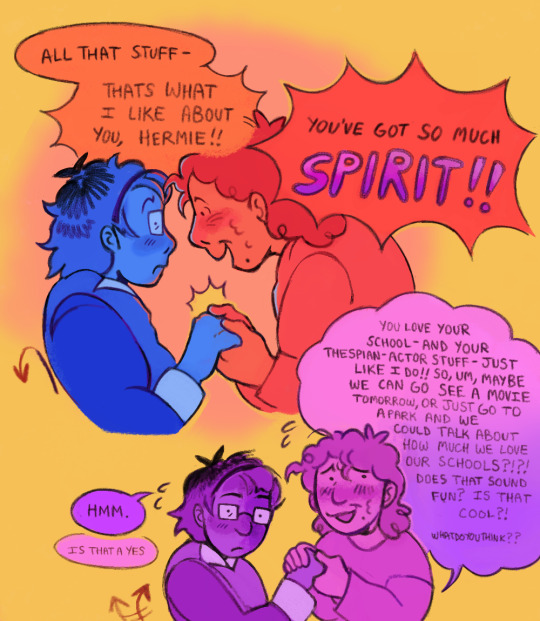
the thespian urge to have a rival love story (and it failing immediately)
#this doesnt belong in the post so im gonna talk about it in the tags#for my hermie design i gave him black hair (only roots cause he dyes it like 24/7) even though i always saw him as having light-brown hair#cause my sibling was like deadset on him having black hair since the beginning#i was like no hes blonde-ish right and they were like you're insane#so im compromising#he dyed his hair green for The Joker but its since faded and washed out now to be like pale dusty blonde#and ever since the whole journey to Hell he's just been lettin that true color grow......#its like a metaphor for identity or something. LET THAT TRUE SELF THROUGH.....!#dndads#dungeons and daddies#dndaddies#dndads s2#oakworthy#normal oak#hermie the unworthy#team oakills! art
1K notes
·
View notes
Text
Thoughts on Aroace Peridot and Nuance in Representation
(This post is both a late contribution to Arospec Awareness Week and a very late reflection on this Variety interview with Rebecca Sugar, published back in November 2023 for the 10-year anniversary of SU's premiere. It is also inspired by the excellent SU analysis of @love-takes-work.)
“That is something that we also wanted to show on the show. Not everyone has to be waiting for a relationship, whether it’s a relationship to lose themselves in, or to make themselves realize something about themselves that they need. You can also realize that that’s not something that you need.”
- Rebecca Sugar on Peridot's intentional aroace coding
Let's talk about Gem fusion, aspec identity and allegory, and everyone's favorite aro-colored Angry Little Slice of Pie, Peridot.
The concept of fusion in Steven Universe is robust enough to support many different meanings and metaphors as the story unfolds. As introduced in the early Season One episode "Giant Woman," fusion is the physical manifestation of a relationship among two or more Gems, in the form of a new, larger Gem with a composite personality and greater abilities. Even when performed for a utilitarian purpose, it holds emotional and social significance for the characters involved—and how could it not, when it gives form, face, and shared consciousness to their interpersonal connection? I would describe fusion as an inhuman intimacy ritual that not only engages the body and mind (like many forms of physical affection among humans) but also redraws the borders of the self (like the construction of an intimate partnership). Clearly, there is potential here for both aromantic and asexual coding. There are also significant hurdles to getting the latter on screen.
The limitations that come with writing for a younger demographic can inspire creative and thoughtful queer narratives that help children build compassionate, progressive worldviews. This has only become truer in the years since SU dared to push the envelope and pave the way. This show excelled at presenting subjects like same-gender affection, trans self-discovery, nonbinary identity, and disinterest in typically romantic activities and gestures, both through quiet normalization—with or without the use of specific labels—and through allegories for more complex struggles and joys.
Even now, though, representing asexuality in a children's cartoon, which by its nature does not deal directly with sexual themes, is tricky. The fluid polysemy of fusion underlies much of SU's queer theming and character writing; but how do you represent asexuality through a character's attitude toward fusion without implicitly conflating this magical ability with sex? I honestly would not have blamed the creators for steering clear of the subject entirely, given that they were already working under threat of cancellation and fighting for every scrap of queerness that made it into the show. But Maya Petersen and other members of the Crewniverse managed to thread the needle.
You can argue, as I'm sure people have, that if all Gems are biologically asexual, and only one anomalous Gem (Rose Quartz) has even experienced sex, then disinterest in fusion can only ever represent aromanticism as an identity and can never be extrapolated to sexual orientation. But that strikes me as a superficial argument, closing off avenues for character analysis and undercutting the very deliberate queer dimension to the writing.
Before reading the above-linked Variety interview with Rebecca Sugar, my response might have been this: None of the fusion relationships we see onscreen in SU are sexual in nature, but this doesn't mean that fusion can't hold that meaning for any Gem or human*, or that a lack of interest in fusion can't serve as an analogy to asexual identity within the narrative. And that's all still true. However, this counterargument is missing something, and that's a child-centered perspective.
Some young children may be aware of asexuality, especially if they know adults who identify as such and have explained it to them in an approachable way. But what does it mean, practically, for a child to know that "asexual" is one way for a person to be, and a word and community that they may or may not find fitting or welcoming to their older selves? Well, they should understand that while many people's ideal future involves an intimate partner or spouse, often comprising a nuclear family unit, there are infinite other paths to happiness and fulfillment. And they should be firmly instilled with the idea that their body is their own, and no one can force them to do things with it that discomfort or simply disinterest them.
Peridot��who is not a child, but is an outsider and an initial skeptic of the Crystal Gems' ways—models all of this beautifully in her welcome-to-Earth arc, reflecting asexual and aromantic experiences simultaneously**. She demonstrates intellectual curiosity around fusion and arrives at a deeper understanding of it through the lens of a fictional pairing she's invested in, but she ultimately decides that the real thing isn't for her, and she is comfortable and steadfast in that decision. Her guide in this exploration is Garnet, who values fusion to the highest degree but doesn't take Peridot's aversion personally—in fact, she immediately says she's proud of Peridot for trying something new but backing out when it stops feeling right; and for endeavoring to understand Garnet better while honoring her own inner truth. Absolutely incredible.
Could this representation have been more overt? In theory, yes. Given the time period and context and executive constraints, likely not. Is it a problem that Peridot is a nonhuman, an alien? Maybe for some people, though I feel that if a character is written with depth and personality, they've already dodged the actual harmful conceptions of ace and aro people as robotic, soulless, or inhuman—even if they happen to be a robot or extraterrestrial. Steven Universe features a diverse cast of nonhumans, all of whom feel deeply and approach fusion from different perspectives; Peridot simply holds one attitude among many. Is it harmful for the ace- and aro-coded character to also be the most noticeably autistic-coded character? I can't personally answer that, except to point out that the SU fandom, like the general population, includes many people who exist in the overlap of those identities and deserve prominence in this discussion. If this post reaches any autistic aspec fans, please share your thoughts. As for the notion that Peridot is infantilized... it's probably for the best that the planned scene with her sitting in a high chair got cut, but regardless, she is an adult. She is competent in some areas and naïve in others; she starts off about as emotionally immature as Amethyst and grows just as far, without ever losing her sense of fun or bombast. Sounds pretty aspirational to me.
(It would be false to say that Amethyst and Peridot are my favorite characters because their coloring matches the ace and aro flags, but it's a delightful coincidence.)
Aroace representation is sparse enough in adult media, where there are theoretically no barriers to mapping out the identity in full. In a child-friendly show, it's pretty astonishing to not see the "ace" factor sublimated into the aro coding to produce a character who's merely uninterested in dating or marriage. I'm not sure there's a way around that in cartoons about normal humans doing normal human things, though I'd love to see another queer-positive kids' show tackle the challenge***. But within the character-driven sci-fantasy of SU, the concept of fusion is fertile ground for laying out these nuances of bodily autonomy and selfhood-within-community, in a way that serves the fictional characters as much as it encourages emotional development in the children watching.
One more reason—as if we needed another—to love this cartoon about learning how many ways there are to love.
~ ~ ~
[On a mostly unrelated note, Steven and Connie are a shining example of a lifelong loving relationship that flows beyond the narrow banks of the friendship-to-romance streamline that audiences tend to expect from young boy-girl friend pairs. It is so, so important to me that we never see their first "real" kiss onscreen, because that milestone changes nothing about the love and devotion they feel for each other. I was very confused, and honestly peeved, when I saw bloggers excitedly declaring Connverse to be "canon" after their casual little kiss in the final scene of Future, because... Steven and Connie have always been together in every way that matters. When was this ever in question? Even within the morass of mortification that is "Together Forever", the show never once entertained the notion that their relationship might not survive. They will continue to be jam buds and best friends and fusion partners and absolute cuties even as an old married couple; we've known this since early days. So who cares about the specific gestures they choose to communicate their affection? (Less diplomatically, I'm very tired of the rigid equation of mouth kiss = romantic = official = canon, and all its equally flawed rephrasings and corollaries, that lead people to denounce some of the queerest stories around as "bait" because there wasn't enough implied saliva.) As individual characters, Connie and Steven may or may not be ace and/or aro, but there's a lovely, refreshing queerplatonic reading to be found in their friendship regardless—and I am so grateful to the crew for simply writing them as kids who think the world of one another.]
Footnotes:
* For example, I do think Rose Quartz was as ace as the rest of them, irrespective of her sexual experimentation with Greg and her other human lovers. But those encounters are hardly framed as thoughtless or meaningless. I imagine Rose as being fascinated by the differences in human and Gem intimacy, and reaching conclusions that subsequently informed and colored her subjective experience of both acts. This is not territory that the show would or should have ventured into, nor is it something I'm personally interested in reading or writing, but it's a valid axis for mature fan discussion nonetheless.
** Not to mention a bit of anti-imperialist deprogramming, as her understanding of fusion expands from "tactical display of force in battle" to "expression of trust and camaraderie, for communal benefit or simply personal enjoyment," and beyond.
*** Lilith from The Owl House is great, and online bonus materials are definitely a step up from Word-of-God pronouncements with no follow-through. But they're still not part of the show canon, and that's a shame.
7 notes
·
View notes
Note
Thank you for your answer! Yup, a good chunk of people have a tendency to oversimplify things or take them at face value from my personal observations.
Red scarf = she compared it to her innocence = she's young = omg, it must be a metaphor for her V card!!! Let's ask Taylor about that theory and ignore that she gifts a red scarf to the bride in the IBYTAM m/v!!!
Bad Blood = is about her feud with Katy Perry over some back up dancers!!! Ignore the fact that the phrase "mad love" was used in romantic context in other songs in the same album!!
So I guess I can see why people may be inclined to think we're basically saying "Taylor and Karlie are together because they've carried the same bag this month!" and simply ignore all nuance or not ask why these information are being shown to us in this manner given how Taylor operates in a careful and strategic way ... like a Mastermind, if you will.
But I guess calling Karlie "poor" for "sitting in the nosebleeds" is much more fun 🤷♀️
thank you for your follow up!
yeah i’m not that great at explaining it but i’m glad we got on the same page!
i think the reason why things are simplified is one thing i have always found interesting about taylor and a lot of her core fans that grew up with her music
its that she in a sense raised them to be on alert to her easter eggs, and made this a part of her persona, but she did so while her fans were also firming very personal and real bonds with taylor in their minds, to the point that the easter egging became melded into the big ball of feelings a lot of people harbor for their image of taylor swift which is an extension of their own identities. the patterns which a lot of us have come to see as PR are also core easter egging memories for a lot of fans, growing up with taylor, and represent a sense of comfort and culture.
which is a wordy way of saying that, any suggestion that taylor does the things she does for reasons either than what they experienced.. it can feel like a personal attack.
what’s so fascinating or beautiful about all this to me is that—and i think this is a common tension of our times—when you go to look at things objectively or try to deconstruct institutions or concepts or biases or modernity.. it can come off clinical and cold and cynical to a lot of people, you know? sort of… ruining ‘nice’ things, right?
but the thing is, when you do this with taylor you instead open up a whole fascinating and lush world of true love and pain, deep stories and fascinating people, actual secrecy and high stakes, that feels incredibly historic and full of meaning. like i can’t tell you how much coming upon gaylor but also kaylor specifically in all its complexities and intricacies has made me feel so much more present in my life and grateful to be alive and to experience the world.. to be more introspectful and to grow.. there’s something so moving and… epic… epoch-ful… about their story. i’m not sure how self aware taylor was when writing timeless but my god, it’s exactly what it is.
so while i definitely understand the mechanics of how some of her core fans instinctively push away thinking critically about taylor, i don’t think i will ever stop feeling like i want to share it to more people because it’s like… if you can break through.. it’s so fucking beautiful 😭😭😭
11 notes
·
View notes
Note
10, 16, & 20 for the pride asks please! :)
20. Have your ocs helped you in self discovery? How?
lets start off with 20 because its defintely the funniest lmaoooo
my main character sam is transmasc (a trans boy) and my tertiary protag is a lesbian (aubry) and she discovers this as the story goes out and let me to tell you there is nothing more hilarious than 1. writing and thinking extensively about how your character is a lesbian and pouring so much into that while being in total denial about yourself and 2. discovering even more about your own inwards trans feelings by giving your transmasc oc 90% of your personality and also through metaphor and symbolism by making a lot of the story a trans analogy. but wait, the character i see the most of myself in, sam, is transmasc but aubry, the second character i see so much of myself in, is a lesbian so how can these seemingly contradictory things be true simultaneously you ask? well it turns out that im a transmasc lesbian. who couldve saw that coming, right? (me. i saw this coming). still the funniest fucking thing about me like "yeah go ahead and tell yourself a story and accidently awaken something in yourself, this will be so funny and cool" and honestly it is so cool! one of the most writing things ive ever done
10. Does your oc celebrate Pride? How?
yes they do! sam has been to a local pride parade/event at some point with his parents (who are bi4bi). he also has a trans flag hanging up in his room that dual functions as a symbol of pride and also a window curtain that turns his room pink and blue at certain times of the day (its intentional). chelsie celebrates pride as well, mostly through self expression like with her clothing and style but she loves pride events too and collecting little pride themed objects that end up in random places. i feel like chelsie's way of celebrating pride is chaotic and spontaneous which suits her. both of them have pride themed bracelets and backpack pins, you know the baby queer stuff i love (i still love the baby queer stuff idc) and sam has trans, bi and rainbow themed tie dye shirts he made and loves to wear. aubry has never seen any pride flag or been to an event and she didnt even know gay people existed as well people and not the boogyman or theoretical person she heard about in church until she realized she was gay and met other queer people (and she literally has two dads LOL). but once she does she cant get enough of rainbows and the lesbian flag which in the alternate universe world where shes from no one knows its meant to symbolize queerness. so she gets to walk around with flags and colors that no one recognizes except her and her family. its hilarious, its her own "no one knows im a lesbian" pin. they just think shes from a different country or something (where all the pretty girls are from). sam and chelsie gifted her a lesbian flag through their mail system once she returned home and she cherishes it. mostly, i'd say my characters celebrate pride through living, being who they want to be and uplifting each other amd they love their glitter, music, make up, tie dye shirts, flags and rainbows too
16. Did you ever change an oc's identity when they were already established? Why?
my character's queer identities have been pretty solid since inception and through their development, its one of the things that have changed the least about them. sam used to be some flavor of trans/nonbinary but there are other nonbinary characters in my story now and sam ids with transmasc the most instead of nonbinary. chelsie has always been transfem as far as i can remember although i mightve imagined her cis one single time and then said "nah im gonna trans your gender no way in hell youre cis" when i didnt feel connected to her characterization [transgenderfication beam]. and aubry has remained gay as hell even as she started off as a completely different person that split into two then i used one half of the personality, refurbished it by gave it some religious trauma, pining and autism to create modern aubry then used the other half for something else. everyone else's personalities have started at the surface level idea of who i think they are and deepened and complexified from there and thats even more intricate than i could describe in one sitting and not always specifically about their queer identity
oh i almost forgot! one character (benjamin, aubry's father) has a bi panic awakening after he went through life identifying as gay and instead of a guy being the source of the panic it was aubry's mother (valid, i'd panic if i saw her too). his character started off as gay but aubry didn't hatch from a magic egg or grow from a pumpkin in a patch or fall to earth like a shooting start (amos's many joke versions of the birds and bees, amos is married to benjamin and is her dad #2) so i needed an explanation for that. he also discovers he's polyamorous in the process so good for him! other characters have become noticeably less cis over time but were already kinda gender weird to begin with if i squinted hard enough. like are you really cis if im writing you? be fr
also, sam's parents in my mind
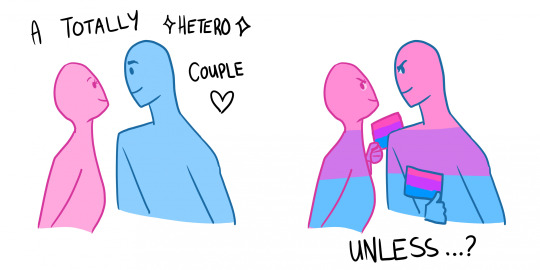
#thanks for playing rachel! <3 ur so cool#ask game#roadtrip! by me#sam (roadtrip!)#chelsie (roadtrip!)#aubry (roadtrip!)
3 notes
·
View notes
Text
Unraveling all the Magic: Exploring all the Timeless Wonder about Spirited Away
On the realm of cartoon masterpieces, few films experience captured the kisses and imaginations about audiences worldwide comparable to Spirited Away. Directed through renowned Hayao Miyazaki and generated by Studio Ghibli, this enchanting report takes viewers about the mesmerizing journey through a world filled by means of magic, mystery, and additionally profound lessons. Let's delve throughout the timeless wonder about Spirited Away and additionally uncover the secrets making it a true cinematic gemstone.Spirited away anime
The Story: A fabulous Spirited Adventure
Spirited Away responds the story about Chihiro, a young child who finds herself trapped within the mysterious and otherworldly likeness after her families unwittingly wander into what is very much an abandoned night-life park. As Chihiro navigates this strange " new world ", she encounters a number of bizarre and additionally fantastical creatures, for example spirits, witches, and additionally gods. To save her parents in order to find her way home, Chihiro must summon valor, resilience, and a huge sense of sympathy as she embarks about the journey of self-discovery.
Themes about Identity and Growth
Located at its core, Spirited Away is mostly a coming-of-age tale which usually explores themes about identity, resilience, and therefore the transformative power about experience. Chihiro's journey seriously isn't a physical one through a fantastical realm as well as a metaphorical a as she grapples with her very own insecurities and frights. Through her encounters along with the various inhabitants for the spirit world, Chihiro understands valuable lessons approximately empathy, kindness, and the significance about staying true to make sure you oneself even when confronted with adversity.
Visual Elegance: Miyazaki's Artistry
About the most striking aspects about Spirited Away is normally its breathtaking toon and visual type. From the lush landscapes for the spirit world to intricately detailed temperament designs, every frame for the film is a fabulous testament to Miyazaki's unequalled artistry and focus on detail. The film's fantastical symbolism transports viewers towards world unlike almost every, filled with whimsy, marvel, and a meaning of magic which usually permeates every location.
Spiritual and Life Allusions
Spirited Away is normally deeply rooted for Japanese folklore and additionally mythology, drawing inspiration in a rich tapestry about spiritual beliefs and additionally cultural traditions. Some of the spirits and life that Chihiro confronts throughout her journey depend on traditional Japanese stories, adding an increased layer of more detail and authenticity to film's fantastical country. By weaving all of these elements seamlessly throughout the narrative, Miyazaki creates a story that feels simultaneously timeless and pretty deep rooted in the country's cultural heritage.
Universal Enchantment: A Story for Ages
Despite the country's cultural specificity, Spirited Away comes with resonated with audiences at all ages and backgrounds all over. Its themes about courage, friendship, and therefore the triumph of all the human spirit really are universal, transcending language and additionally cultural barriers to the touch the hearts about viewers everywhere. Whether you're your youngsters marveling at the wonders for the spirit world or the reflecting on all the deeper themes for the film, Spirited Away offers something for the whole family to enjoy and additionally appreciate.
Conclusion: A fabulous Masterpiece of Animation
On the pantheon of cartoon films, Spirited Away stands in the form of true masterpiece, beloved by spectators and critics alike now for the stunning visuals, high storytelling, and outstanding themes. As we getaway alongside Chihiro on the whimsical realms for the spirit world, people are reminded of all the boundless creativity for the human imagination and therefore the transformative power about storytelling. In the, Spirited Away is beyond just a film—it's any enchanting experience that lingers on the heart and mind long as soon as credits roll.
1 note
·
View note
Text
i think i figured it out.
my mom asked me what it is that i look for in people (specifically in reference to partners but i also think this broadly applies to people i enjoy most) and i talked about the intersection of caring, TRUE understanding, and fascination (those last two tend to go pretty hand in hand). i’ve had partners who have cared but could never understand and who held no mystery for me and partners who so deeply understood and fascinated me but just didnt have the space to care as much as they did (care being the quality that makes the thing last on their end while fascination is what makes things last on my end), but what it is exactly about certain people that makes them fascinating to me is hard to pin down. this is partly because i think all people are inherently interesting and have interesting things about them, but dear god do they play up the parts that are unbearably boring (and that in and of itself is kind of fascinating to me). i suppose the specific kind of fascination i look for comes from people who are distinct and who live. my friends back home are like this. my one friend is a painter and lives with her boyfriend in his mom’s apartment and his mom is a fashion designer and will let my friend add on to paintings she made when she was in design school and we’ll get together with our friend who does parkour and works in landscaping and breaks into construction zones and our friend who works in the local deli and is working on his own fashion brand and we smoke and we watch someone play re4 and then go out bowling or get ramen and play with roadkill. my friends from oregon who throw the most oregon-ish house parties and wear vintage suits and listen to prairie home invasion and do archaeology and constantly wanna go on a pilgrimage to any sort of hill and move like fucking cartoon characters and write parody beat poetry are also like this. there is something about them and their commitment to an idea and their capacity to just fucking live and be messy that i don’t find in people here at university and it is exactly what i need from people. i dont care about perfect morality or purity--i want the mess. obviously i think we should all strive to be the best we can and i have my own commitments to ideology, but i hate the need to make everything clean and simple and easy to swallow. i hate this optimized, advertiser-friendly, marketable version of living. i need someone who really fucking struggled but damn it they’re trying. my ex’s favorite book was winesburg ohio and i read it on his birthday after we broke up, but the concept of grotesque that it identifies is exactly it. people who are so fucking committed to some truth (maybe multiple) that it makes them grotesque. a desire to be distinct while still wanting to be a part of something bigger, a desire to be loved, anything. for me, my struggle is with truth itself as something that i believe both does and doesnt exist at least as we understand it. we concern ourselves so much with factual or philosophical or ideological truth, but this is inaccessible to us and maybe isnt even there. perhaps there is truth in wholly sacrificing the self and living through pure sensation, but what’s the value in that if you cant share it? for me, its the human truth that matters. communication isnt perfect and that sensory truth gets lost in translation, but the way we try to capture it and connect with one another and understand is EVERYTHING. story, metaphor, symbol. its EVERYTHING. we have gone so far down the ladder of language that we can no longer agree with one another on what even exists, but if we climb then we can find commonality and meaning in metaphor. obviously its a complicated issue in the modern identity-driven era where we’ve built a society that begs us to kill anything we may have once regarded as god, but i think its necessary to have faith in something yknow? post-structuralism has points and is totally more suited for an era where fluidity is more necessary, but i wonder if its actually attainable. we think in structure. we think in archetypes. we try to abandon or ignore them but they dont go away (and dont get me started on modern retellings of myths that ignore symbolism and turn them into character driven narratives. the death of metaphor makes me want someone dead) and really i think we need to try to understand them again and learn that they themselves are not rigid things and that subverting an existing archetype is meaningful and that they allow for a richness in fluidity. ANYWAY. point being i like people who just are.
1 note
·
View note
Text
reverserry
this is a compilation of harry ~putting it in reverse~
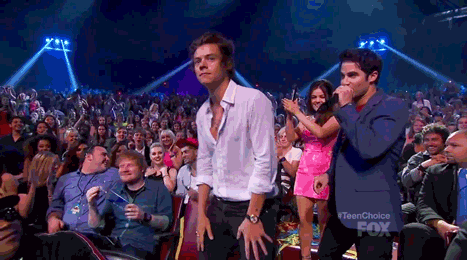
Harry lives a double life. His public persona is a straight male sex symbol, defined by stunt relationships, brands, and ingenuity. His true self contrasts in his gender identity, sexuality, desire for intimate connection with fans, and his Home with Louis. No matter how fake his media persona is, Harry Styles™ is still a reality he has to live in.
I believe Harry uses upside down or backwards imagery to show that things are not as they seem (Harry Styles™ vs H), and to signify the dual realities he lives in.
Through this post, I have strung together the theories of many to reference to the dual realities of Harry’s expression, the A-side and the B-side:
The A-side and B-side are the two sides of phonograph records and cassettes; these terms have often been printed on the labels of two-sided music recordings. The A-side usually features a recording that its artist, producer, or record company intends to be the initial focus of promotional efforts and radio airplay and hopefully become a hit record. The B-side (or "flip-side") is a secondary recording that typically receives less attention, although some B-sides have been as successful as, or more so than, their A-sides. [x]
Through this definition, Harry’s A side is his media persona because it is the most popularly seen side of his life. It is easy and obvious to see. Those of us willing to reverse the tape see a whole new message. When Harry references the reverse (or B side), it’s a
metaphor for what we’re given in the media and what you see at surface level. But the reverse…what you don’t see…the truth [read more] from @headscarvesandtattoos

Dorothrry
"Home is a place we all must find, child. It's not just a place where you eat or sleep. Home is knowing. Knowing your mind, knowing your heart, knowing your courage. If we know ourselves, we're always home, anywhere." -Glinda, The Good Witch
As we know, home is a central concept to both Harry and Louis. [read more] from @bluewinnerangel
In Wizard of Oz, “home” is a place that existed inside of Dorothy; she had the power to go home inside of her the whole time. For Harry and Louis, “home” means something similar: a private, internal reality that they are each other’s home. A reality they can access mentally/emotionally whenever they want.

You Are Home newspaper ads
The wallpaper runs in both directions; it looks the same whether the text or the image is right side up. The archway and text are about (a private, internal alternate reality of) home, but the images refer to Harry’s House. Therefore, these ads express both the true and false realities.
Doors generally symbolize the threshold between here and somewhere else. Through the You Are Home campaign, Harry is letting us in to his internal reality through hints and clues behind the door. He is inviting us in, but it is up to us to walk through it.
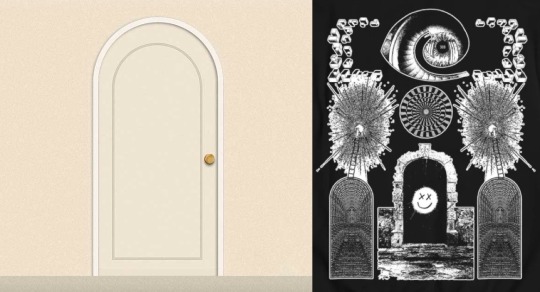
Dimensions of Consciousness
According to @so-idialed-9 in this post, the use of arches, spirals, 369, and portal-like imagery by Harry and Louis are referencing a journey to a higher level of consciousness, which I interpret as an internal/mental alternate reality:
“In Louis' images, the sky or glass is shattering. Again symbolizing a new opening.”
“369 is a method to manifest your dreams because of what the individual numbers represent in numerology.”
“Arches symbolize a threshold, a decision to enter a new kind of time and space. Arches are very strong and thus offer protection, and they're portals that encourage you to move forward.”
Spirals are used “to represent a journey that leads to a higher level of knowledge about self and the world.”
Louis’ 369 merch imagery might also be referring to the alternate dimension in which he interacts with fans about his and Harry’s B-side:
“the boy on the ladder is in front of the shattered glass and he is spray painting Louis’ dead-eyed smiley face over the circular opening in the glass…The boy appears to have traveled through hole in the “Fourth Wall” of the Walls MV…we might interpret the space beyond the Fourth Wall as an alternate dimension…where artist and viewer interact.” [read more] from @genuinemusic
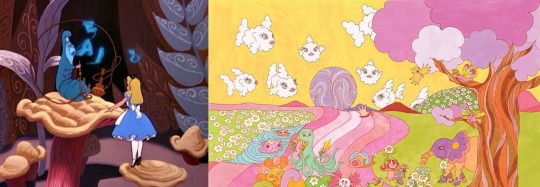
Psychedelics
We might also see the similarities in imagery & concepts between You Are Home, Shroom Bloom, and Alice in Wonderland as another version of a mental alternate reality, this time induced by psychedelics. [read more] from @skepticalarrie
“Sweet creature / We're running through the garden / Oh, where nothing bothered us."
Reminiscent of Dorothy and Alice entering dreamlike almost psychedelic alternate worlds that are bright and full of color and look to be whimsical, magical almost, gardens/alternate or parallel worlds full of flowers and colors and things that can't possibly be real. [read more] from @twopoppies

Harry’s egg/bubble
In the Fine Line album artwork, Harry is inside and in color (vibrant, full of life, dynamic), in direct opposition with him being outside and in black and white (static, lifeless). If we see these two images as Harry on the inside and outside of the same space/object, we might see it as two sides of the same coin, or dual opposing realities.

Mirror Writing & the Looking Glass
When Harry uses Eroda as the reverse of Adore, he is using mirror-writing. Literary figures such as Da Vinci used mirror-writing to represent a reverse in perception and to challenge the rigidity of the society and tradition.
The term mirror-writing is more closely associated with text; if we are referencing the reverse depiction of something else, such as a concept or visual, the term “looking glass” is used. The most famous example is “Through the Looking Glass” by Lewis Carrol, in which Alice goes down the rabbit hole into the flip reality of her world.
“When you look in a mirror, you see a backwards image of yourself, but it’s also representative of looking beyond the surface of the glass of the mirror. It symbolizes an alternate universe or place where things are contrary to the real world… anything that uses the looking-glass crosses over into a bizarre universe. It usually means unpredictability and strange happenings [and]…. symbolizes consciousness and its ability to reflect reality in reversed words and visuals in literature.” [read more] from @aliensyndrome
If we expand our view of Eroda from simply a mirror-writing perspective, we can see it as a looking-glass society:
“Everything about the town is odd and eerie. It discusses life and death. With it being the reverse term of Adore, then it flips the definition. Instead of adoration, it’s condemnation. Instead of invitation, it’s entrapment. Instead of tradition, it’s counterculture. Instead of normal, it’s eccentric. Everything about Eroda exists in the uncanny valley. it looks pleasant. It feels pleasant, but something is off and no one can quite put their finger on what… An advertisement for a beautiful oasis getaway that is more sinister in foundation” [read more] from @aliensyndrome
Back-masking
Similar in concept is back-masking. In this case, the reverse message is expressed through reversed audio (typ. reversed lyrics). Harry used back-masking in Sunflower Vol. 6, where he reverses the word “sunflower” and She, hinted by “around 1:32,” where he says “I want Lou, yes I want Louis.”
More controversially, he might have also back-masked some lyrics in Fine Line and Adore You, but that’s up to you to decide😉

Harry’s House vs Harry’s Home
I think this album will tell the story of Harry’s two-sided truth: the image is Louis’ public house; showing it upside down means is not really home, just the public facade.
His expression is contemplative. Perhaps he is wondering what the point is in playing pretend when all that it leaves him is an empty shell (mostly bare room, eggshell white?). Where he feels like a toy to be used at the benefit of others. He might be thinking that keeping up the house/facade costs him more than it is worth:
An ‘upside down mortgage’ or 'to go upside down on a house’ is a saying that basically means that “the owner owes more than the house is worth”.
Anything upside down, (consider Stranger Things) can signify a parallel universe, a different world. In the Harry’s House album art, home is a parallel universe (alternate reality as I call it). His worlds are split so aggressively that when he really is Home, it seems like a different life entirely.
Harry is dressed as a doll with ballet shoes, indicating a performance or playing pretend. He has turned the whole dollhouse upside down to indicate it is the false reality.

HS3 announcement video
Played forward, the message the general population understands is Harry Styles™ leaves home, lives a busy, exciting traveling life, enjoys stepping on stage, and raises a house— because haha cute it’s Harry’s House and there’s Harry and a house.
Of course, when we look closer, there is a B side. The audio is reversed, so we know the real video is to be watched in reverse: the facade of a house starts to smoke and it comes down around H (tearing down everything he’s built?). He survives the “stunt” by standing still, a Steamboat Bill Jr reference [read more] from @vlnylstyles
Instead of a smiling Harry ready to perform, we see a tired Harry, unable to keep up the Facade anymore.
He leaves the stage and his performance through 27 clips of chaos to go home to the 28th clip, (thanks @bluewinnerangel) the daffodils (symbolizing queerness, 10th anniversaries and Louis' favorite flower).
The Harry’s House announcement video also references the play A Doll’s House by Henri Ibsen. In the play, Nora realizes that she’s just been playing the roles others want her to, being used as a plaything. She eventually leaves her husband and family to be her true self. Similarly, Harry is only a person with agency when he’s off that stage. On stage, he’s a doll in a dollhouse doing stunts. He stays still and goes through the motions while he’s also out-of-body, an onlooker of his fake life. He’s living what appears to be the picture-perfect life but actually has many secrets. People don’t love him, they love the idea of him. [read more] from @infinitelymint

The Matrix
I won’t go too in depth here bc I have spoken about my thoughts on Harry and The Matrix in [this post], but if the red and blue characters in AIW represent the pills in the Matrix, we can see them as symbolic of a duality of self or dual realities, explained well by @genuinemusic in this in-depth AIW analysis:
The idea of two selves - one enlightened and one ignorant - is represented in the film by Neo’s reflection in Morpheus’ sunglasses. In this moment, he has two selves and two possible futures. Put together, we can begin to interpret Harry’s performance with his counterpart as a struggle between two selves.
Outlook
HS2 brought many references of A-side/B-side reverserry, but HS3 materials so far aren’t simply describing the B-side. It’s hard not to see the facade coming down, the upside down house, sitting outside the sphere, the blue character in As It Was disappearing, and the reference to A Doll’s House as Harry dismantling his A-side.
Three clicks of the ruby slippers brought Dorothy home, does the third album bring Harry home?
#symbolism#as it was mv#you are home#h gender#as it was#the matrix#larry movie night#alice in wonderland#through the looking glass#mirror writing#harry’s house#hs3#reverserry#alternate reality#eroda#shroom bloom#dorothrry#wizard of oz#pop culture#trackinghappily#tracking happily#tracksintheam#tracking home#trackinghome#mine
20 notes
·
View notes
Text
[ - ] LORD OF RAGE [ - ]

The Lords are perhaps the most confident Heroes in themselves as you’ll find, and this is a good thing in moderation, but some may be driven to using their influence and Command over their environment to belittle others and boost their own ego. This is especially true of the Rage-bound, who find self-reflection and understanding personal boundaries are two of their most desirable goals. They’ll get where they want to go and find their place in the world no matter how many people they have to push out of the way to achieve it. Often shown to be egotistical and self-centred, it’s more likely than not that they’ve taught themselves independence is the only solution when forging a path for growth. They’ll never lean on others for support, but having others come to them for guidance is exactly what they want. The more networks and reliance the better.
They’re a commanding force wherever they go, adept at picking up the pieces of an otherwise lost group and fitting them back together neatly. It’s often a shame, to this end, that the Lord would rather, shape and mould to a vision that suits them rather than the wider scope of the world, thus creating something more likely to crumble the next time around. They have a magnetic sort of personality, but it’s not because they’re particularly pleasant. Instead, they build their identity through hidden facets, only revealing things about themself if they deem it necessary for a personal progression (or one for another that would loop around once more and end up powering them despite everything else). Though they may seem one for solitude, the Lord of Rage revels in the company others can provide them in the end.
As with many other Lords, they are more than happy to sit back and let the great cosmic clashes play out in front of them, their aspects’ handle on self-assurance doing its exact job to keep everything in place until later. Rage can also account for more metaphorical angers and dramatic, world-altering shifts in a space, but that will be what the Lord has to look out for. They lack a specific position in Skaia, for their presence may grow to become vaster than accounted for - Rage is the Power of Selfhood, after all, and it resides in every being upon the Battlefield or beyond it. In their battles, they’ll either forge their own divergent path or wait. By the time they’re met with the Battlefield in the first place, they’ll either have set their plans in motion and need to do very little pushing it along or will simply watch it blossom in front of them.
The Lord of Rage, regardless of the all-encompassing nature of the powers given to them, is a solitary and bitter soul. Above all, for this reason, they resent Blood players for their connectivity and desire to create even more of the bonds that have failed them. Hope and Life are worthless pursuits for them to look towards, as they are grounded in the harshness of reality. They think it naivety and - ironically - hopelessness to put any faith in such powers. The same goes for almost any competing Master Class, and they dislike feeling overshadowed by Light or Mind Heroes. However, there are few they find solace in: They prey on the weak and always will, so (on top of the innate cloaking bonus one may provide) Void and Breath are worthwhile allies, as are unrealised Pages and any Negatively-swayed classes who don’t mind disorder like the Bard.

~ ☀️
#homestuck#homestuck rage#homestuck lord#lord of rage#lord of rage analysis#homestuck class#classpect#classpect analysis#homestuck classpect#homestuck aspect
23 notes
·
View notes
Text
July Colorful Column: Remus is a Crip, and We Can Write Him Better.
There is one thing that can get me to close a fic so voraciously I don’t even make sure I’m not closing other essential tabs in the process. It doesn’t matter how much I’m loving the fic, how well written I think it is, or how desperately I want to know how it ends. Once I read this sentence, I am done.
It’s written in a variety of different ways, but it always goes something like this: “You don’t want me,” Remus said, “I am too sick/broken/poor/old/[insert chosen self-demeaning adjective here].”
You’re familiar with the trope. The trope is canonical. And if you’ve been around the wolfstar fandom for longer than a few minutes, you’ve read the trope. Maybe you love the trope! Maybe you’ve written the trope! Maybe you’re about to stop reading this column, because the trope rings true to you and you feel a little attacked!
Now, let’s get one thing out of the way right now: I am not saying the trope is wrong. I am not saying it’s bad. I am not saying we should stop writing it. We all have things we don’t like to see in our chosen fics. Maybe you can’t stand Leather Jacket Motorbike Sirius? Maybe you think Elbow Patch Remus is overdone? Or maybe your pet peeves are based in something a little deeper - maybe you think Poor Latino Remus is an irresponsible depiction, or that PWPs are too reductive? Whatever it is, we all have our things.
Let me tell you about my thing. When I first became very ill several years ago, there were various low points in which I felt I had become inherently unlovable. This is, more or less, a normal reaction. When your body stops doing things it used to be able to do - or starts doing things you were quite alright without, thank you very much - it changes the way you relate to your body. You don’t want to hear my whole disability history, so yada yada yada, most people eventually come to accept their limitations. It’s a very painful existence, one in which you constantly tell yourself your disability has transformed you into a burdensome, unworthy member of society, and if nothing else, it’s not terribly sustainable. Being disabled takes grit! It takes power! It takes a truly absurd amount of medical self-advocacy! Hating yourself? Thinking yourself unworthy of love? No one has time for that.
Of course, I’m being hyperbolic. Plenty of disabled people struggle with these feelings many years into their disabilities, and never really get over them. But here’s the thing. We experience those stories ALL THE TIME. Remember Rain Man? Or Million Dollar Baby? Or that one with the actress from Game of Thrones and that British actor who seemed like he was going to have a promising career but then didn't? Those are all stories about sad, bitter disabled people and their sad, bitter lives, two out of three of which end in the character completing suicide because they simply couldn’t imagine having to live as a disabled person. (I mean, come on media, I get that we're less likely to enjoy a leisurely Saturday hike, but our parking is SUBLIME.) When was the last time you engaged with media that depicted a happy disabled person? A complex disabled person? A disabled person who has sex? No really, these aren’t hypothetical questions, can you please drop a rec in the notes?? Because I am desperate.
There are lots of problems with this trope, and they’ve been discussed ad nauseam by people with PhDs. I’m not actually interested in talking about how this trope leads to a more prevalent societal idea that disabled people are unworthy of love, or contributes to the kind of political thought processes that keep disabled people purposefully disenfranchised. I’m just a bitch on Tumblr, and I have a bone to pick: the thing I really hate about the trope? It’s boring. I’m bored. You know how, like, halfway through Grey’s Anatomy you realized they were just recycling the same plot points over and over again and there was just no WAY anyone working at a hospital prone to THAT MANY disasters would stay on staff? It's like that. I love a recycled trope as much as the next person (There Was Only One Bed, anyone?). But I need. Something. Else.
Remus is disabled. BOLD claim. WILD speculation. Except, not really. You simply - no matter how you flip it, slice it, puree it, or deconstruct it - cannot tell me Remus Lupin is not disabled. Most of us, by this point, are probably familiar with the way that One Canonical Author intended One Dashing Werewolf to be “a metaphor for those illnesses that carry stigma, like HIV and AIDS” [I’m sorry to link you to an outside source quoting She Who Must Not Be Named, but we’re professionals here]. Which is... a thing. It’s been discussed. And, listen, there’s no denying that this parallel is a problematic interpretation of people who have HIV/AIDS and all such similar “those illnesses” (though I’ll admit that I, too, am perennially apt to turn into a raging beast liable to harm anything that crosses my path, but that’s more linked to the at-least-once-monthly recollection that One Day At A Time got cancelled). Critiques aside, Remus Lupin is a character who - due to a condition that affects him physically, mentally, emotionally, and intellectually - is repeatedly marginalized, oppressed, denied political and social power, and ostracized due to unfounded fear that he is infectious to others. Does that sound familiar?
We’re not going to argue about whether or not “Remus is canonically disabled as fuck” is a fair reading. And the reason we’re not going to argue about whether or not it’s a fair reading is because I haven’t read canon in 10-plus years and you will win the argument. Canon is only marginally relevant here. The icon of this blog is brown, curly haired Remus Lupin kissing his trans boyfriend, Sirius Black. We are obviously not too terribly invested in canon. The wolfstar fandom is now a community with over 25,000 AO3 fics, entire careers launched from drawing or writing or cosplaying this non-canonical pairing. We love to play around here with storylines and universes and races and genders and sexualities and all kinds of things, but most of the time? Remus is still disabled. He’s disabled as a werewolf in canon-compliant works, he’s disabled in the AUs where he was injured or abused or kidnapped or harmed as a child, he’s disabled in the stories that read him as chronically ill or bipolar or traumatized or blind or Deaf. I’d go so far as to say that he is one of very few characters in the Wide Wonderful World of media who is, in as close to his essence as one can be, always disabled. And that means? Don’t shoot the messenger... but we could stand to be a tiny bit more responsible with how we portray him.
Disabled people are complicated. As much as I’d like to pretend we are always level-headed, confident, and ready to assert our inherent worth, we are still just humans. We have bad days. We doubt our worth. We sometimes go out with guys who complain about our steroid-induced weight gain (it was a long time ago, Tumblr, okay??). But, we also have joy and fun and good days and sex and happiness and families and so many other things.
Remus is a disabled character, and as such, it’s only fair that he’d have those unworthy moments. But - I propose - Remus is also a crip. What is a crip? A crip - like a queer - is someone who eschews the limited boundaries placed on their bodies, who rejects a hierarchy of oppression in favor of an intersectional analysis of lived experience, who isn’t interested in being the tragic figure responsible for helping people with dominant identities realize how good they have it. Crips interpret their disabilities however they want, rethinking bodies and medicine and pleasure and pain and even time itself. Crips are political, community-minded, and in search of liberation.
Remus is a character who struggles with his disability, sure. But he’s also a character who leverages his physical condition to attempt to shift communities towards his political leanings, advocates for the rights of those who share his physical condition, and has super hot sex with his wrongfully convicted boyfriend ultimately goes on to build community and family. Having a condition that quite literally cripples you, over which you have no control, and through which you are often read as a social pariah? That’s disability. But using said condition as a means through which to build advocacy and community? Now that’s some crip shit.
Personally, I love disabled!Remus Lupin. But I love crip!Remus Lupin even more. I’d love to see more of a Remus who owns his disability, who covets what makes him unique, and who never ever again tells a potential romantic partner they are too good for him because of his disability. This trope - unlike There Was Only One Bed! - sometimes actually hurts to read. Where’s Remus who thinks a potential romantic partner isn’t good enough for him? Where’s Remus who insists his partners learn more about his condition in order to treat him properly? Where’s sexy wheelchair user Remus? Where’s Remus who uses his werewolf transformations as an excuse to travel the world? Where’s crip Remus??
We don’t have to put “you don’t want me” Remus entirely to bed. It is but one of many repeated tropes that are - in the words of The Hot Priest from Fleabag - morally a bit dubious. And let’s face it - we don’t always come to fandom for its moral superiority (as much as we sometimes like to think we do).
This is not a condemnation - it is an invitation. Able-bodied folks are all but an injury, illness, or couple decades away from being disabled. And when you get here, I sincerely hope you don’t waste your time on “you don’t want me”ing back and forth with the people you love. I’m inviting you to come to the crip side now. We have snacks, and without all the “you don’t want me” talk, we get to the juicy parts much faster.
Colorfully,
Mod Theo
#wolfstar#disability in fandom#disabled remus#crip remus#please write me some crip remus#I beg of you#fandom meta
110 notes
·
View notes
Photo

I’m Looking Forward Now 💖Thank you and good bye
So, it’s been a little over a week since Steven Universe Future ended…
I’ve been hesitant to write this, honestly, but I’m tired of holding myself back from properly expressing myself in fear of appearing overly invested in the media I consume, even in private. Writing helps me organize my thoughts and feelings, and I feel like these thoughts in particular may resonate with many, so I want to share them. I want to talk about what Steven Universe has done for me personally, both as an artist, and as a person.
I’ve been around since the day the first episode of the original series aired. I actually remember when Steven Universe was just a logo on Wikipedia’s “List of Upcoming Cartoon Network Shows” list, back when I was a freshman in high school. It piqued my interest, but when commercials finally dropped for it, I thought it was going to be bad because of the way marketing handled introducing Steven as a likeable character. There was still something about it that made me want to give it a chance though, so I went online and watched the pilot before the first episode's release. I was hooked immediately. I knew I was going to love it, and I did. I fell so absolutely in love with Steven as a character, and the world that he and the gems lived in. I became obsessed. I was always so excited for new episodes to come out. Little did I know what else it would do for me as I went through my adolescence alongside it.
As the show progressed, it was evident that what I wanted out of a western animated childrens’ cartoon was finally coming into fruition: this show was becoming serialized. There was continuity, there was plot, there was character development-- it was getting deep. It was pushing the groundwork that Adventure Time laid out even further (thank you, Adventure Time).
I will give credit where credit is due: earlier western childrens’ cartoons I grew up with like Hey Arnold, and Rugrats, among others, also touched on heavy topics, but Steven Universe was able to take similar ideas (and even more complex ones, concerning mental health and relationships) and expand on them outside of contained episodes and/or short arcs. These themes, which were a part of the show’s overarching story, spanned across its entirety. Continuity was rampant.
What did this mean? It meant kids cartoons didn’t have to be silly and fun all the time and characters weren’t just actors playing a part in 11-minute skits. Steven and the gems would remember things that happened to them, and it affected them and how they would function and play a part in their story. This was a huge deal to me as a teenager. I always wanted the cartoons I grew up with featuring kid characters to feel more. In my own work, I often felt discouraged when combining a fun, cutesy western art style with themes as dark or layered as anime would cover. I always thought it had to be one or the other because an audience wouldn’t take a combination of the two seriously enough, based on discussions I had with classmates, friends, and online analysis I read at the time. Steven Universe proved to me otherwise. This show was opening the door for future cartoons exploring in-depth, adult concepts. I felt so seen as a kid, and was inspired to stick with what I love doing.
I was actually very worried about the show’s survival. It was in fact immensely underrated and the fandom was miniscule. Then in 2014, JailBreak dropped, and it’s popularity exploded. Part of it was because of the complex plot and the themes it was covering like I mentioned, but also because of its representation.
I remember when fandom theorized that Garnet was a fusion due to grand, tragic reasons. Turns out, she’s simply a metaphor for a very loving w|w relationship. This was huge. I cannot stress how important it is that we continue to normalize healthy canon queer relationships in childens’ media, and Steven Universe finally was the first to do that proper. Introducing these themes offers the chance for a kid to sit there and ask themselves, “Why is this demonized by so many people?” I asked myself exactly that. Ruby and Sapphire were my cartoon LGBT rep. They were the first LGBT couple I ever ecstatically drew fanart of. I was dealing with a lot of internalized homophobia at the time, and they showed me that I was allowed to love women and feel normal about it. The process of overcoming this was a long one, but they played a part in my very first steps into becoming comfortable with my sexuality. I could go on and on about it’s representation in general-- how it breaks the mold when it comes to showcasing a diverse set of characters in design, in casting, and in breaking gender roles. It’s focus on love and empathy. Steven himself is a big boy, but he's the protagonist, and the show never once makes fun of his weight, or any other bigger characters for that matter. It wasn’t hard to see why the fandom had grown so large.
Fandom was always a joy for me. It was a hobby I picked up when I was in middle school, like many of us here did. I would always cater my experience to fun, and fun only. I only started getting more deeply involved in SU’s fandom when I had just turned into an adult. During the summer of 2016, between my first and second year of college, I drew for the show almost every day non-stop when the Summer of Steven event was going on and posted them online. This was a form of practice for me in order to become not just more comfortable with experimenting with my art, but also to meet new artists, make new friends, and learn to interact with strangers without fear. I dealt with a ton of anxiety when I was in high school. When I was a senior applying to art school for animation, I decided I was going to overcome that anxiety. I made plans to take baby steps to improve myself over the course of my 4 years of college. Joining the fandom, while unforeseen, was definitely a part of that process. I started feeling more confident in sharing my ideas, even if they were fan-made. I fell in love with storyboarding after that summer, when I took my first storyboarding class, and genuinely felt like I was actually getting somewhere with all of this. I remember finally coming to a point in my classes where I could pitch and not feel hopelessly insecure about it. I was opening up more to my friends and peers.
But this process, unfortunately, came to a screeching halt.
My life completely, utterly crumbled under me in the Fall of 2017 due to a series of blows in my personal life that happened in the span of just a couple weeks. My mental health and sense of identity were completely destroyed. All of that confidence I had worked for-- completely ruined. I was alone. I nearly died. My stay at college was extended to 4 and half years, instead of the 4 I had intended. I lost my love for animation-- making it, and watching it. I could no longer watch Steven Universe with the same love I had for it beforehand. It’s a terrible thing, trying to give your attention to something you don’t love anymore, and wanting so desperately to love again. I dropped so many things I loved in my life, including the fandom.
Healing was a long and complicated road. I continued to watch the show all the way up until Change Your Mind aired in the beginning of 2019, and while I still felt empty, that was definitely a turning point for me with it’s encapsulation of self-love. I was hoping James Baxter would get to work on Steven Universe since he guest-animated on Adventure Time, and it was incredible seeing that wish actually come true. The movie came out and while I enjoyed it and thought highly of it, I was still having issues letting myself genuinely love things again, old and new. It was especially difficult because cartoons were my solace as a kid, when things got rough at home. I remember feeling sad because the show ended, and not getting the chance to love it again like I used to while it was still going.
By the time Steven Universe Future was announced, I was finally coming around. I was genuinely starting to feel excitement for art and animation again. I wasn’t expecting there to be a whole new epilogue series, but happily ever after, there we were! Prickly Pear aired, and the implications it left in terms of where the story was going did it. I was finally ready to let myself take the dive back into fandom in January of this year. My art blew up, something I wasn’t expecting considering my 2-year hiatus. Following this, I was invited into a discord server containing some of the biggest writers, artists, editors, and analysts in the fandom. I had no idea there were so many talented people in the fandom, some already with degrees, some getting their degrees-- creating stuff for it on the side just for fun. The amount of passion and productivity level here is insane, and so is the amount of discussion that has come out of it.
I didn’t realize it at first, but it was actually helping me gain back the courage to share ideas. I lost my confidence in pitching while I was taking the time to heal, and graduating meant there would no longer be a classroom setting I could practice in. This group helped immensely.
I have made so many friends through this wonderful series, and I have so many fond memories talking to like-minded creatives, getting feedback and a myriad of sources for inspiration, as well as all of the memes and jokes and weekly theorizations that came about as we all waited on the edges of our seats for episodes to air. I needed this so badly, I needed to get back in touch with my roots, when I would go absolutely hog-wild over a cartoon I loved with people who loved it as much I did. Future has been a blessing for me in this way. I graduated feeling like I was back at square-one, but now I feel like I’m on my way again.
It’s 2020 and while I’m doing great right now, I am honestly still recovering from the total exhaustion that followed after graduating a few months ago, and finally leaving the campus where my life fell apart behind. Needless to say, watching Future was like looking into a mirror. Watching one of my favorite characters of all time-- one that grew up with me-- go through so many of the same things I went through not too long ago was absolutely insane to watch unfold. It’s such an important thing too, to show a character go through the process of breaking down over trauma and all the nasty things that come with it, and to have them go on the road to healing. Steven got that therapy. He wasn’t blamed. The gems were called out. The finale was everything I could have ever hoped for. The catharsis I experienced watching it was out of this world.
As I continue my own healing journey, I will always look up to the storyboard artists, revisionists, and designers that I have been following over these past 7 years, as well as the new ones introduced in Future. It's been such a joy watching these artists release their promo art for episodes, talk about their experiences working on the show, and post the work they've done for it alongside episodes airing.
Thank you Rebecca Sugar, the Crewniverse, and the fans, for making this such a truly wonderful and unique experience. Thank you for reminding me that I am, and always will be, an artist, a cartoonist, and a fan. Thank you, my followers, for the overwhelmingly positive response to my artwork. I have had so much fun interacting and discussing the show with you all again over these past few months. Steven Universe and it’s fandom will always have a special place in my heart, and it will always be a classic that I will return to for comfort and inspiration for decades to come. I am sad that the cartoon renaissance is over, but so many doors have been opened thanks to this show. I am so, so excited to see what this show will inspire in the future, and I hope one day I get the opportunity to be a part of that.
Goodbye Steven, thank you for everything. I wish you healing, and I wish Rebecca and the team a well-deserved rest. ♥️
-Cynthia D.
#steven universe#steven universe future#steven universe future finale#steven quartz universe#the future#i am my monster#good bye steven universe#thank you steven universe#crystal gems#garnet#amethyst#pearl#bismuth#lapis#peridot#greg universe#connie maheswaran#lion#su#suf#su future#art#artists on tumblr#illustration#tears#lineless
5K notes
·
View notes
Text
The Les Miserables Changelog Part 3: 1987 Broadway Production
Hello, everyone! This is the latest edition in my attempt to chronicle all of the musical and lyrical changes which the show Les Miserables has undergone over the years. This time, we're going through all the changes between the musical as it existed on the West End around 1985-1986 and the revised libretto for the 1987 Broadway production.
In some ways, this is a much easier changelog to compile than the last two simply because it is much easier to find audio evidence of the show from this era than from its pre-1987 self. We have a full soundboard of the original Broadway cast as well as a very good quality bootleg of the very first Broadway preview, as well as several audios from the next few years which use exactly the same script. We also have an officially released Symphonic Soundtrack which almost (but not quite) follows this version of the libretto exactly. So no more relying on unclear bootlegs and speculation to figure out what was changed when!
Having said that, the changes in this production were MASSIVE. It's almost certainly the most extensive edit the show's libretto has received to this day. As such, this will be a very long edition of this blog. So make sure you have a bit of time on your hands before reading it! With all that cleared up, let's begin.
The first change literally can be heard as soon as the musical begins. The pre-Broadway show opens up with the same recurring motif also heard, for instance, at the openings of "At the End of the Day" and "One Day More". This music then transitioned to the instrumentals to the opening "Work Song". The post-Broadway libretto cuts right to the chase, with the opening instrumentals to the "Work Song" starting right up without any preamble.
One interesting little non-scripted change occurs later in the "Work Song", but only in American productions. For whatever reason, every American Javert from the original Broadway cast until the first Broadway revival sang "And I am Javert" instead of "And I'm Javert", for reasons that honestly baffle me. Again, the libretto retained the original contraption as far as I'm aware, and the West End production as well as later UK and Australian tours still used it as well.
The next change happens while Valjean is on parole. After Valjean pleads against the farmer underpaying him, this was the farmer's original response:
Do you believe
A yellow ticket of leave
Allows a criminal like you to earn full screw?
Since Broadway, his response is instead as follows:
You broke the law
It's there for people to see
Why should you get the same as honest men like me?
I much prefer this revised version. Though the information is essentially the same, it feels more dramatic, as well as feeling less awkward now that it is in the form of separate sentences as opposed to a single sentence spoken in three lines with pauses in between. Moreover, the phrase "honest men like me" as used here provides interesting foreshadowing for its more well-known usage in "Master of the House". One could spend quite some time analysing the implications of this recurring description, but this blog is long enough as it is so now isn't the time!
In the same number, originally the innkeeper's wife had the following remark:
My rooms are full
And I've no supper to spare
I'd like to help you really, all I want is to be fair
Since Broadway, her line has been slightly modified:
My rooms are full
And I've no supper to spare
I'd like to help a stranger, all we want is to be fair
I suppose "I'd like to help a stranger" sounds less slang-y than "help you really". Presumably this is why it was changed. I find the change of subject from singular to plural far more interesting. My hypothesis is that the writers wanted to make it clear than this is a communal grudge, not a personal one. Everyone around sees it as perfectly fair to deny shelter to a former convict, not just this one individual. I definitely prefer the revised line, but evidently the producers of the West End production didn't; that production held on to the original lyrics for more than a decade after they were originally revised! More on that in a later edition of this blog...
A more minor change can be heard during "At the End of the Day". Originally, Valjean asks the factor workers "What is this shouting all about?" The Broadway script changes this to "What is this fighting all about?" Much less trivial implications now. I'm curious as to whether or not a staging change may have accompanied this. Usually the two workers get into quite a bit of physical scuffle by this point, far beyond the realm of shouting. Did the original pre-Broadway production use more subdued choreography?
"The Runaway Cart" has some noticeable differences. After Valjean asks the townspeople for help, the original response was sung by the entire ensemble, and went as follows:
(SOLO)
Don't go near him, Monsieur Mayor
There's nothing at all you can do
(ENSEMBLE)
The old man is a goner for sure
Leave him alone
The Broadway libretto revised this into a sequence sung by one individual at a time with the following lyrics:
Don't go near him, Monsieur Mayor
The load is as heavy as hell
The old man is a goner for sure
It will kill you as well
A female ensemble member sung "The old man is a goner for sure" while a male member sung the rest. I sort of like it better as an ensemble piece (something that would be largely brought back in later years, as I'll soon discuss) although I think it's cool that it rhymes now. Having said that, I'm fairly confident that no one in the real world has ever actually used the phrase "Heavy as hell"!
An official change in the libretto occurred in "Who Am I?" but listeners to the original Broadway cast would not have heard it. While the pre-Broadway show had Valjean refer to "This innocent who bears my face", the revised libretto instead refers to "This innocent who wears my face". Perhaps a means of avoiding repetition, given that the word "bear" is used again later in the number? Regardless, Colm Wilkinson didn't actually bother to adapt to this change! He still sings "This innocent who bears my face" in the Broadway production (as well as the tenth anniversary concert; not until his 1998 stint in Toronto did he ever start singing the revised lyrics). Since every future Valjean (except Ivan Rutherford for some reason) sings "wears", I still see it as appropriate to mention here.
At the end of the song, Valjean's "You know where to find me!", used on and off in the Barbican previews before becoming a settled part of the production by the final pre-Broadway libretto, is once again removed for the Broadway show. However, the West End production would keep it for a few years - more on that later...
Just listening to the original Broadway cast, one might think Javert's "Dare you talk to me of crime?" becomes "Dare you speak to me of crime?" However, this seems to be a Terrence Mann-exclusive change. Every Javert after him reverts to the original lyrics (as did Terrence himself when he returned to the musical fifteen years later). I'm still making note of the change here for the sake of clarification.
An instrumental change occurs between "Castle on a Cloud" and "Master of the House". Mme. Thenardier's "You heard me ask for something and I never ask twice" was original followed by three bars of notes, then by six more bars of notes that are identical to each other. After the Broadway production, however, those six bars of notes grow increasingly more dramatic as they go on.
A very slight change happens during the preamble to "Master of the House". Originally one of the guests proclaims "Hell, what a wine" while the revised libretto instead has him claim "God, what a wine". Definitely more natural in my opinion, though not a huge difference by any means.
A few subtle differences exist in the "Waltz of Treachery" number. First off, Thenardier originally asks "Have we done for your child what is best?" The Broadway libretto changes "your child" to "her child". I personally like the original lyric better, as it goes back to the idea established earlier that Valjean is metaphorically bargaining through the spirit of Fantine. It's definitely not a difference that makes or breaks the number, though.
Towards the end of the song comes another change that cannot actually be heard by listening to the original Broadway cast. In the pre-Broadway show, Valjean used the line "Let us seek out a friendlier sky", while the revised libretto has him say "Let us seek out some friendlier sky". However, Colm Wilkinson once again doesn't bother to adapt to the change, and unlike the "Who Am I?" change he wouldn't learn it over time either. He continues to sing "a friendlier sky" throughout his on-and-off performances as Valjean, right up to and including his 2002 run in Shanghai!
After the bulk of the number comes a more significant change. Prior to the Broadway production, as was discussed in the last entry, the "Waltz of Treachery" was followed by about forty-five seconds of vamping and then this exchange in the tune of "Castle on a Cloud":
(LITTLE COSETTE)
We're going home right now, monsieur
What is your name
(VALJEAN)
Now my dear
I've names enough, I've got names to spare
But where I go, you always will be there
Nor will you be afraid again
There is a sun that's shining yet
(LITTLE COSETTE)
I'm going to call you my Papa
(VALJEAN)
I'm going to call you my Cosette
The Broadway libretto replaced it with just under twenty seconds of vamping, followed by a sequence in the tune of the "Waltz of Treachery":
(VALJEAN)
Come Cosette
Come my dear
From now on I will always be here
Where I go
You will be
(LITTLE COSETTE)
Will there be children
And castles to see?
(VALJEAN)
Yes, Cosette
Yes it's true
There's a castle just waiting for you
This is followed by another fifteen or so seconds of vamping, and then the humming duet between Cosette and Valjean carries on as before.
Arguably the biggest change in the entire edited libretto happens now. Whereas the number was originally directly followed by "Stars", things have been moved around so that it instead transitions directly into "Look Down". "Look Down" itself receives a lot of adjustments. First off, the number began in the pre-Broadway musical with a bar of music that was then repeated. The Broadway version only plays the bar of music once, and the sung part happens immediately afterwards.
Gavroche's verse receives some lyrical updates. Originally it used the following lines:
This is my school, my high society
From St. Denis to St Michel
We live on crumbs of humble piety
Tough on the teeth, but what the hell?
If you're poor, if you're free
Follow me, follow me!
The Broadway production rewrote that sequence a little:
This is my school, my high society
Here in the slums of St Michel
We live on crumbs of humble piety
Tough on the teeth, but what the hell?
Think you're poor? Think you're free?
Follow me, follow me!
Better lines in my humble opinion; "slums" conveys the poverty of Gavroche's community much more effectively than the original line, and phrasing the "poor" and "free" lines as questions is more dramatic than their original statement form.
The old beggar woman's original "You give 'em all the pox" becomes the less grammatically accurate "Give 'em all the pox" for Broadway, though I have no idea if the original "You" was part of the libretto or simply an improvisation. Since seemingly all actresses used that line for the first few years of the West End production, it strikes me as warranting a mention.
Right after this comes another change. In the pre-Broadway show, the argument between the beggar woman and the prostitute was followed by an exchange by a few individual beggars. All of the following lines were said by one person at a time, the first three being said by female beggars and the last one by a male beggar:
When's it gonna end?
When're we gonna live?
Something's gotta happen, dearie
Something's gotta give
The Broadway libretto changes this to an ensemble piece performed by all the beggars simultaneously:
When's it gonna end?
When're we gonna live?
Something's gotta happen now or
Something's gotta give
I really like the switch to a group effort, as it really emphasizes that the beggars are a community sharing the burden of poverty. It really feels like an epidemic to an extent that it doesn't when it's just a small conversation. Evidently the producers of the West End show didn't agree with me though, as they held onto the original sequence for more than a decade after the official change, and by that point it had already been largely reverted worldwide! More on that in a later blog...
Originally, the exposition about General Lamarque was given by a few random students (supposedly not specified in the libretto, but in practice portrayed as Combeferre and Feuilly). Some ensemble dialogue between beggars was put in between. Feuilly sings over the end of the ensemble's lines - but many have speculated that this was not intended by the writers, as the background music sounds super out of sync with his singing! Here's how the scene went:
(COMBEFERRE)
As for the leaders of the land
As for the swells who run this show
Only one man and that's Lamarque
Speaks for the people here below
(BEGGARS)
Something for a meal
Something for a doss
Something in the name of Him who died upon the cross
On the cross, come across
On the cross, come across, come across
(FEUILLY)
Lamarque is ill and fading fast
Won't last the week out, so they say
With all the anger in the land
How long before the judgement day?
Before we cut the fat ones down to size?
Before the barricades arise?
Fortunately, the writers of the Broadway libretto had the sense to change the purveyors of the message into people actually relevant to the show's plot, namely Marius and Enjolras. Moreover, the beggars' dialog was rewritten into a sequence that feels far less clunky to me. The background music was fixed to account for the solo singing (now done by Marius) overlapping the beggars' lines, so it is now perfectly in sync. Here's the edited exchange:
(ENJOLRAS)
Where are the leaders of the land?
Where are the swells who run this show?
(MARIUS)
Only one man and that's Lamarque
Speaks for the people here below
(BEGGARS)
See our children fed
Help us in our shame
Something for a crust of bread in Holy Jesus' name
(SOLO BEGGAR)
In the Lord's holy name
(BEGGARS)
In His name, in His name, in His name
(MARIUS)
Lamarque is ill and fading fast
Won't last the week out, so they say
(ENJOLRAS)
With all the anger in the land
How long before the judgement day?
Before we cut the fat ones down to size?
Before the barricades arise?
Much better in my opinion! It should be noted that David Bryant instead sings "these people here below", but as far as I can tell every future Marius (or later Enjolras - more on that later) sings "the people, which is the actually phrasing in the libretto.
One final change in Look Down: Gavroche now says that all of Thenardier's family is "on the make", as opposed to the original "on the take". A rather pointless change in my book, though it certainly doesn't hurt anything.
"The Robbery" is another heavily edited number. Thenardier's line after acknowledging Brujon, Babet, and Claquesous was originally as follows:
You Montparnasse, watch for the p'lice
With Eponine, take care
You've got all the hash, I've got all the cash
The Broadway show rewrote those lines into their still-current form:
You Montparnasse, watch for the law
With Eponine, take care
You turn on the tears, no mistakes my dears!
This changed lyric more naturally transitions the scene into the gang's actual plan, though the original is an interesting continuation of Gavroche's recollection of Thenardier once running a hash house.
Mme. Thenardier's response is also altered from the original lyrics:
Here come a student from our street
One of 'Ponine's peculiar gents
Our Eponine would kiss his feet
She never showed a bit of sense
Into the current ones:
These bloody students on our street
Here they come slumming once again
Our Eponine would kiss their feet
She never showed a scrap of brain
It's interesting how the edit shifts the focus from Marius in particular to the students in general. It seems that Mme. Thenardier is less aware of the specifics of her daughter's personal life now, something that makes sense for her character.
After Mme. Thenardier's "You'll be in the clear", there was originally just eighteen seconds of a musical motif (the same one which opens "At the End of the Day" and "One Day More") followed by Thenardier's speech. Since Broadway, it's instead been followed by a few more lines of dialogue:
(MARIUS)
Who is that man
(EPONINE)
Leave me alone!
(MARIUS)
Why is here?
Hey Eponine!
Only now does the musical motif play. But instead of staying silent upon seeing Cosette, Marius now sings "I didn't see you there, forgive me..." Interestingly, in this video of a 1987 performance of the original West End production, Marius just stops without bumping into Cosette as he usually does. This makes me wonder whether or not the bumping was added into the Broadway version, and the lyric was added to accomodate for the blocking change. Of course, this is all speculation; I have no way to know for sure.
Thenardier's con job is also quite a bit different post-Broadway. Originally it used the following lyrics:
How you do? Spare a sou
God will see all the good that you do
Look monsieur, lost a leg
Hero of Waterloo now has to beg
Wait a bit, know that face...
The Broadway libretto edited it into its current form:
Please monsieur, come this way
Here's a child that ain't eaten today
Save a life, spare a sou
God rewards all the good that you do
Wait a bit, know that face...
It's interesting how Thenardier's facade shifts in focus from his own supposed hardship to that of an alleged child. I suppose the latter would be a good bit more effective in convincing passersby to donate!
During "Javert's Intervention", Thenardier now says "It was me that told you so, as opposed to the original "Wot told you so"; however, this seems to be a regional choice to account for a lack of Cockney accent, not an official libretto change. British productions retain the original "Wot".
“The Robbery” ends quite differently. Its pre-Broadway form had Gavroche’s remarks directly follow Javert’s “Clear this garbage off the street!” However, now Javert’s line is instead followed by some instrumentals to a slower version of the same tune as, for instance, “Honest work/Just reward/That’s the way to please the lord” and “He will bend/He will break/This time there is no mistake”.
After these instrumentals come the “Stars” number, now in a much more natural location given that Javert now has a logical reason to be thinking about Valjean!
The number itself is mostly the same, up until the final segment. After Javert’s “Those who falter and those who fall must pay the price”, he originally had the following lyrics:
Scarce to be counted
Changing the chaos
To order and light
You are the sentinels
Silent and sure
Keeping watch in the night
Keeping watch in the night
The post-Broadway show replaced this with a much more climactic remark:
Lord let me find him
That I may see him
Safe behind bars
I will never rest ‘til then
This I swear
This is swear by the stars
WOW, what an improvement! Now the stars are tied much better to Valjean himself, and Javert’s motivation is much clearer!
Now that “Stars” is over, we finally get Gavroche's remarks. The lyrics are the same; however, instead of the tempo progressively getting faster as it goes along, it now gets progressively slower. Interestingly the audio of the first preview has Gavroche saying "mother dear" instead of "auntie dear", but it's back to the original line by the second known original Broadway cast audio. Both audio feature Braden Danner; whether the "mother dear" was a choice on his part or a director's, a flub, or a libretto change that was later reverted is unknown.
"Eponine's Errand" has some significant changes. First off, the original libretto gave Marius and Eponine this exchange:
(MARIUS)
Did you see that lovely girl
(EPONINE)
A lovely two-a-penny thing
The Broadway libretto edited it a little:
(MARIUS)
Eponine, who was that girl?
(EPONINE)
Some bourgeois two-a-penny thing
Marius' request has also been changed from its original lyrics:
Eponine, do this for me
But careful how you go
Your father mustn't know
He'll strike another blow
'Ponine, I'm lost until she's found
Into some far clearer and more direct instructions:
Eponine, do this for me
Discover where she lives
But careful how you go
Don't let your father know
'Ponine, I'm lost until she's found
And yes, the line was "your father" right from day one. Michael Ball flubs it as "her father" on the complete symphonic recording, leading many to assume that was the original lyric which was changed later. But I'm not aware of a single live performance to use that lyric (which doesn't make a lot of sense anyway).
Another side note: Some Marius actors have very slightly changed the third line to "Be careful how you go" or "But careful as you go", though neither lyric is the standard.
Post-Broadway, as the instrumentals to "Red and Black" play, a student (I'm not sure which one) now shouts Enjolras' name before the singing begins.
During "Red and Black", Michael Maguire changes the original "It is easy to sit here and swat 'em like flies" to "Oh, it's easy to sit here and swat 'em like flies". However, this is an individual choice of the actor, not an official libretto change. Every future Enjolras I'm aware of (except Ramin Karimloo for some reason) uses the original line.
An actual libretto change occurs soon afterwards. After Marius' entrance, Grantaire originally asks, "Marius, what's wrong with you today?" The post-Broadway show changes this to "Marius, you're late. What's wrong today?" This makes it much clearer why Grantaire might suspect something is wrong.
Soon afterwards, Grantaire's original line "We talk of battles to be won, and here he comes like Don Juan" is slightly tweaked to "You talk of battles to be won". This is a little more appropriate, since Grantaire isn't actually doing a lot of talking!
After "Red and Black", Gavroche's part is very slightly changed. First off, American performances for a few years would have Gavroche whistle right before everyone quiets down, though I have no idea if this was in the libretto or not.
Secondly, Gavroche's original remark, "It's General Lamarque! He's dead!" is shortened to just "General Lamarque is dead!"
In another contender for the biggest change in the entire edit, the entire "I Saw Him Once" number is totally removed. I have mixed feelings about this. It does give Cosette, a frustratingly underwritten character, some additional content. However, stylistically it's not all that much like any other number in the musical, and it doesn't really add enough information to the show to warrant a whole song. So I say with regret that it was probably for the best to delete the number.
To compensate for the lost number, "In My Life" is lengthened to include the establishing character moments that "I Saw Him Once" originally did. Originally it opened as follows:
(COSETTE)
Dearest papa, can I tell him of this?
How can I tell him the things that I feel?
How could he understand?
(VALJEAN)
Dear Cosette, you're such a lonely child...
The post-Broadway opener is instead as follows:
(COSETTE)
How strange, this feeling that my life's begun at last
This change, can people really fall in love so fast?
What's the matter with you Cosette?
Have you been to much on your own?
So many things unclear
So many things unknown
In my life
There are so many questions and answers
That somehow seem wrong
In my life
There are times when I catch in the silence
The sigh of a faraway song
And it sings of a world that I long to see
Out of reach, just a whisper away, waiting for me
Does he know I'm alive? Do I know if he's real?
Does he see what I see? Does he feel what I feel?
In my life
I'm no longer alone
Now the love in my life is so near
Find me now, find me here
(VALJEAN)
Dear Cosette, you're such a lonely child...
After Valjean gives Cosette his cryptic defense of his secrecy, Cosette had a remark that is sadly incredibly hard to understand in the quality of the recordings we have. It apparently went something like this:
There are voices I hear
That come into my mind
Full of noise, full of fear
When the noise was unkind
In my life
I'm no longer afraid
And I yearn for the truth that you know
Of the years, years ago
Her post-Broadway response is much shorter:
In my life
I'm no longer a child
And I yearn for the truth that you know
Of the years, years ago
Shorter, but just as effective in my book. Plus, the use of the word "child" nicely ties into Valjean's initial remark that Cosette is "such a lonely child", as well as Cosette's frustration that he still sees her as "a child who is lost in the woods".
The next number, "A Heart Full of Love", also has a LOT of rewritten lyrics. First of all, after Marius' "I do not even know your name", these are his original lyrics:
Dear mademoiselle
I am lost in your spell
The Broadway production changed the lyrics into:
Dear mademoiselle
Won't you say? Will you tell?
I suppose this fits a little better with his remark about not knowing Cosette's name.
After Marius and Cosette finally learn each other's names (an important step in a relationship if you ask me!) this was their original way of showing their affection:
(MARIUS)
Cosette, your name is like a song
(COSETTE)
My song is you
(MARIUS)
Is it true?
(COSETTE)
Yes, it's true
The Broadway production rewrote it into the following:
(MARIUS)
Cosette, I don't know what to say
(COSETTE)
Then make no sound
(MARIUS)
I am lost
(COSETTE)
I am found
In my opinion, the rewrite captures the slight awkwardness of young love much better, as well as making a lot more sense!
Immediately afterwards, this is the original exchange:
(MARIUS and COSETTE)
A heart full of love
A heart full of you
(MARIUS)
The words are foolish but they're true
Cosette, Cosette
What were we dreaming when we met?
(COSETTE)
I can sing
(MARIUS)
Dear Cosette
(COSETTE)
A heart full of love...
The Broadway libretto redoes the scene as the following:
(MARIUS)
A heart full of love
(COSETTE)
A night bright as day
(MARIUS)
And you must never go away
Cosette, Cosette
(COSETTE)
This is a chain we'll never break
(MARIUS)
Do I dream?
(COSETTE)
I'm awake
(MARIUS)
A heart full of love...
Almost a totally different scene! The post-Broadway variant is better structured, but I do like the original too.
As the trio of Marius, Cosette, and Eponine exchanges inner monologues, Marius originally has the line "I saw her waiting and I knew". The Broadway libretto changed this to "A single look and then I knew". I kind of prefer the original, as it implies a little more than something as trivial as a cursory glance.
In the closing lyrical overlap of the song, Cosette originally sings "Waiting for you", but post-Broadway she sings "I knew it too". Then, she originally sings "At your call" but post-Broadway she sings "Every day".
During the opening to "The Attack on Rue Plumet", Montparnasse refers to Valjean as "the one that got away the other day" as opposed to his original "the bloke wot got away the other day". However, this is another regional change made for the sake of making sense outside of a cockney accent. The official libretto still had the original lyrics.
A tiny change occurs during Thenardier and Eponine's fight. Claquesous originally thinks it's a palaver and an absolute treat "to watch a cat and its father" picking a bone in the street. The Broadway libretto changed this to "see a cat and a father". Why exactly the writers felt the need to make such a miniscule edit is mystifying to me, but it certainly doesn't hurt anything.
Another change occurs later in the number, after Eponine's scream. Originally this was Thenardier's reaction:
Make for the sewers, don't wait around
Leave her to me, go underground
You wait my girl, you'll rue this night
I'll make you scream, you'll scream alright!
These lines were mixed up a bit for the Broadway libretto:
You wait my girl, you'll rue this night
I'll make you scream, you'll scream alright!
Leave her to me, don't wait around
Make for the sewers, go underground
The post-Broadway variation arguably is a bit less climactic due to it not ending on a threat. However, the original climax isn't all that appropriate since Eponine and Thenardier never actually interact at any later point in the musical. I like that the post-Broadway version ends on something that's actually relevant to the remainder of the show (namely, that Thenardier will be in the sewers). Evidently the West End producers didn't agree with me; this is another line in which the original was kept there for more than a decade (at which point a rewrite closer to the original was already being used worldwide)!
In "One Day More", Javert's "One day more to revolution" is slightly changed to "One more day to revolution". However, the number is otherwise unchanged.
And that's it for Act One! The opening barricade scene to act two has a small change. Grantaire's pre-Broadway "Some will bark, some will bite" was changed to "Dogs will bark, fleas will bite". Makes a lot more sense in my opinion!
The opening to "On My Own" is changed as well. Originally it was performed as follows:
And now I'm all alone again
Nowhere to go, no one to turn to
I did not want your money sir
I came out here 'cause I was told to
The Broadway version rewrote it into the following:
And now I'm alone again
Nowhere to turn, no one to go to
Without a home, without a friend
Without a face to say hello to
A huge improvement in my book. It actually rhymes now, and is far less likely to be misconstrued as ungrateful.
After receiving a massive overhaul not that long before, "Little People" was slightly tweaked for the Broadway show. The pre-Broadway version had this ending:
So never kick a dog
Because he’s just a pup
You’d better run for cover when the pup grows up!
Another line (taken from the original longer version of "Little People" as well as all versions of its reprise) was added for the post-Broadway show:
So never kick a dog
Because he’s just a pup
We'll fight like twenty armies and we won't give up
So you’d better run for cover when the pup grows up!
Grantaire's line afterwards is literally reversed in meaning from the original "Better far to die a schoolboy than a policeman and a spy!" into "What's the difference? Die a schoolboy, die a policeman, die a spy!" This post-Broadway lyric fits better into Grantaire's cynical personality.
A very subtle edit is made in "Little Fall of Rain" (to the point that I only just realized its existence by reading an old internet forum!) Pre-Broadway, Marius asks Eponine "Did you see my beloved?" The tense is changed from past to present perfect for the Broadway libretto, so that he now sings "Have you seen my beloved?"
"Drink with Me" receives quite a bit of editing. The opening few lines are originally all sung by Grantaire:
Drink with me to days gone by
Sing with me the songs we knew
Here's to pretty girls who went to our heads
Here's to witty girls who went to our beds
Here's to them and here's to you
Now, those lyrics are split between various students:
(FEUILLY)
Drink with me to days gone by
Sing with me the songs we knew
(PROUVAIRE)
Here's to pretty girls who went to our heads
(JOLY)
Here's to witty girls who went to our beds
(ALL STUDENTS)
Here's to them and here's to you
A far more touching scene now that it entails an entire group of friends reminiscing about their lives, as opposed to the thoughts of one heavily drunk individual.
Originally this was followed by a segment by the male ensemble:
Drink with me to days gone by
To the life that used to be
At the shrine of friendship never say die
Let the wine of friendship never run dry
Then, this was followed by the same lyrics, but sung by the male and female ensembles overlapping. The Broadway libretto removes that and replaces it with an all-new segment with Grantaire. It's much more cynical and philosophical than his original lines:
Drink with me to days gone by
Can it be you fear to die?
Will the world remember you when you fall?
Could it be your death means nothing at all?
Is you life just one more lie?
The lyrics from the pre-Broadway show, in their male-and-female overlapping form, are played afterwards.
The next change occurs during the Second Attack. Pre-Broadway, this was how the opening lyrics went:
(ENJOLRAS)
How do we stand, Feuilly make your report
(FEUILLY)
We've guns enough but bullets running short
(MARIUS)
Let me go into the street
There are bodies all around
Ammunition to be had
Lots of bullets to be found
Some very small edits were made for Broadway:
(ENJOLRAS)
How do we stand, Feuilly make your report
(FEUILLY)
We've guns enough but ammunition short
(MARIUS)
I will go into the street
There are bodies all around
Ammunition to be had
Lots of bullets to be found
The following exchange also is a bit edited. Here's how it went pre-Broadway:
(ENJOLRAS)
I can't let you go, it's too much of a chance
(MARIUS)
And the same can be said for any man here
(VALJEAN)
Let me go in his place, he's no more than a boy
I am old and alone and have nothing to fear
Post-Broadway, it instead goes as follows:
(ENJOLRAS)
I can't let you go, it's too much of a chance
(MARIUS)
And the same is true for any man here
(VALJEAN)
Let me go, he's no more than a boy
I am old, I have nothing to fear
Finally, Gavroche's final lines are as follows pre-Broadway:
So never kick a dog
Because he’s just a pup
You’d better run for cover when the pup grows up
And we’ll fight like twenty armies and we won’t give…
A small edit is made for the Broadway production, so that the latter two lines are reversed:
So never kick a dog
Because he’s just a pup
We’ll fight like twenty armies and we won’t give up
So you’d better run for cover when the pup grows...
I'd say this is an improvement, since Gavroche's death is all the more impactful when his literal last unfinished words are about growing up.
Not long afterwards comes the Final Battle. Leading up to Enjolras' climactic moment, the original lines went as follows:
(ENJOLRAS)
Come on my friends, though we stand here alone
Let us go to our deaths with our face to our foes
(COMBEFERRE)
Let 'em pay for each death with a death of their own
(COURFEYRAC)
If they get me, by God, they will pay through the nose
(ENJOLRAS)
Let others rise to take our place
Until the earth is free
The sequence was edited for Broadway, giving a bit more breathing space:
(ENJOLRAS)
Let us die facing our foes
Make them bleed while they can
(COMBEFERRE)
Make them pay through the nose
(COURFEYRAC)
Make them pay for every man
(ENJOLRAS)
Let others rise to take our place
Until the earth is free
"Dog Eats Dog" is a very heavily-edited number. First off, the vamping at the beginning originally lasts about 30 seconds. By Broadway, it has been reduced to about nineteen seconds.
After Thenardier's "As a service to the town" line, he originally sung the following lines:
It's a world where the dogs eat the dogs
And the worst is as good as the best
It's a stinking great sewer that's crawling with rats
And one rat is as good as the rest
I raise my eyes to see the heavens
And only the moon looks down
That entire sequence was cut for Broadway.
Soon afterwards, Thenardier originally proclaims "Here's a little toy". The Broadway edit changes it to "Here's another toy", perhaps to make it seem less repetitive after his "pretty little thing" line.
The exact same lines from after "As a service to the town" are repeated in the pre-Broadway number after Thenardier's "When the gutters run with blood" line, with one more line added afterwards:
It's a world where the dogs eat the dogs
And the worst is as good as the best
It's a stinking great sewer that's crawling with rats
And one rat is as good as the rest
I raise my eyes to see the heavens
And only the moon looks down
The harvest moon shines down
Unlike the first instance of those lines, they aren't completely excised for Broadway. They are, however, significantly rewritten:
It's a world where the dogs eat the dogs
And they kill for the bones in the street
And God in His heavens, He don't interfere
'Cause He's dead as the stiffs at my feet
I raise my eyes to see the heavens
And only the moon looks down
The harvest moon shines down
I really like how the edited version focuses more on godlessness than on how gross the sewer is. Not that a lack of a god is inherently sinister; I am quite agnostic myself and I think the unbreakable connection between religion and morality alleged by some is ridiculous. But it is blatantly obvious that Thenardier sees no reason to be moral provided no one will punish him.
As a side note, the 1985 London official soundtrack oddly uses this variant, yet the 1986 bootleg audio I have uses the original. Perhaps the original was experimented with, reverted, and later put in again? Who knows...
After the number, Thenardier now shouts Valjean's name.
The encounter in the sewers between Valjean and Javert originally ended as follows, with Javert's first two lines here in a tune not heard anywhere else in the musical to my recollection:
(VALJEAN)
Come, time is running short
(JAVERT)
Go take him, I'll be waiting at the door
I've never met a man like you before
A man such as you
The sequence was extended for the Broadway libretto, to the tune of "Look Down" and the "Work Song":
(VALJEAN)
Come, time is running short
Look down, Javert
He's standing in his grave
(VALJEAN - simultaneously with the next two lines)
Give way, Javert
There is a life to save
(JAVERT - simultaneously with the previous two lines)
Take him, Valjean
Before I change my mind
(JAVERT)
I will be waiting, 24601
A slight change can be heard in "Every Day". Originally Marius sings that he and Cosette will "remember that night and the song that we sang". The Broadway libretto edited this into the decidedly less medium-aware "remember that night and the vow that we made".
"Valjean's Confession" has been reworked to the point that it can scarcely even be considered the same song. After Valjean's "There's something now that must be done", this was how the song went:
(VALJEAN)
Monsieur, I cannot stay a night beneath your roof
I am a convict, sir, my body bears the proof
My name is Jean Valjean
I never told Cosette, I bear this guilt alone
And this I swear to you, her innocence is real
Her love is true
Our love, our life, are now her own
And I must face the years alone
(MARIUS)
I do not understand what's the sense of it all?
Is the world upside down?
Will the universe fall?
If it's true what you say, and Cosette doesn't know
Why confess it to me?
Why confess it at all?
What forces you to speak after all?
(VALJEAN)
You and Cosette must be free of reproach
It is not your affair
There is a darkness that's over my life
It's the cross I must bear
It's for Cosette this must be faced
If I am found, she is disgraced
(MARIUS)
What can I do that would turn you from this...
After the Broadway rewrite, Valjean's "There's something now that must be done" is followed by this:
(VALJEAN)
You've spoken from the heart, and I must do the same
There is a story, sir, of slavery and shame
That you alone must know
I never told Cosette, she had enough of tears
She's never known the truth, the story you must hear
Of years ago
There lived a man whose name was Jean Valjean
He stole some bread to save his sister's son
For nineteen winters served his time
In sweat he washed away his crime
Years ago
He broke parole and lived a life apart
How could he tell Cosette and break her heart?
It's for Cosette this must be faced
If he is caught she is disgraced
The time is come to journey on
And from this day he must be gone
Who am I?
Who am I?
(MARIUS)
You're Jean Valjean
What can I do that will turn you from this...
The few lines afterwards are the same, but as you can see not much else in the song is! Even the tune diverges a lot between the two variants. I'm very conflicted about which one I prefer. I gravitate towards the final one, though it's nice that the original actually tried to address to confusing notion that Valjean wants to tell his son-in-law of his past yet not his own daughter.
"Beggars at the Feast" originally ended with a solo for Thenardier:
(THENARDIER and MME. THENARDIER)
We know where the wind is blowing
Money is the stuff we smell
(THENARDIER)
And when I'm rich as Croesus
Jesus, won't I see you all in Hell!
The Broadway libretto switched this to a group line:
(THENARDIER and MME. THENARDIER)
We know where the wind is blowing
Money is the stuff we smell
And when we're rich as Croesus
Jesus, won't we see you all in Hell!
I much prefer the revised version, as the two Thenardiers clearly are in this act together. It seems more appropriate to let them both have the last laugh.
A small change occurs in the Epilogue. Pre-Broadway, Fantine sings "You raised my child with love". However, post-Broadway, she instead sings "You raised my child in love".
Another change occurs later in the epilogue. In the pre-Broadway show, Cosette tells Valjean that "It's too soon to ever say goodbye". The post-Broadway libretto instead has her sing "It's too soon, too soon to say goodbye". Repetitive as it may be, I prefer it over the original because the original awkwardly combines language clearly denoting the moment with language implying eternality.
Phew, we're finally at the end! Rest assured this is almost certainly the longest changelog you'll ever be forced to endure. I'm fairly sure it's complete, but this particular rewrite was so extensive it's not impossible that I missed something. Please feel free to let me know if that is the case.
As a side note, both for this project and my own enjoyment, I want as complete a collection of Les Miserables audios as possible. I already have most of what’s commonly circulated, but if you have any audios or videos you know are rare, or some audios that you haven't traded in a few years, I’d love it if you DMed me!
Until the turntable puts me at the forefront again, good-bye…
#les miserables#les mis#changelog#les mis changelog#marius#valjean#cosette#javert#eponine#enjolras#thenardier#1985#1987#broadway#part 3#long post#the les miserables changelog
112 notes
·
View notes
Text
Red and Gray in a Black and White World
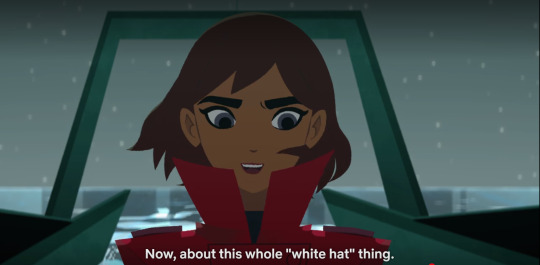

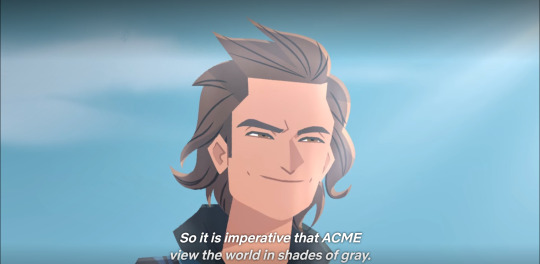
Carmen Sandiego likes playing with colors.
In particular, VILE is black, while ACME is white.
This is why Carmen’s codename is Black Sheep, which later becomes ironic when she grows to be VILE’s literal “black sheep” and their thorn in the side. At the same time, Shadowsan too has a codename suggesting something dark in color. Of course, his name also foreshadows that he is the one protecting Carmen from the shadows.
Similarly, the ACME’s agent closest to Carmen is Julia Argent aka “silver”. She is not completely “white” and she is able to see the complexity of the world, differently from Devinaux and Zari.
As a matter of fact the whole point is that Carmen refuses a black and white vision of things. She doesn’t want to join VILE, but she doesn’t want to be a part of ACME either:
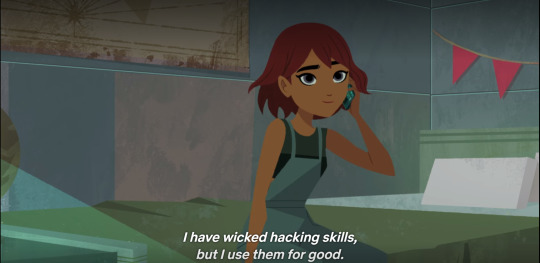
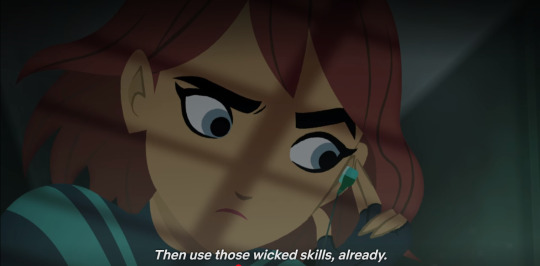
She wants to use her “wicked skills” for good.
This is a fitting theme for a show whose aim is to help kids learn about geography and how rich Earth is. It conveys the idea of complexity.
In other words, Carmen explores the world and its wonders at her own pace and with her own rules. This is expressed by her color being “red”. Everything about her is red. Her codename, her clothes and even her adoptive family:

Similarly, Gray is another character, who is neither black nor white, but (obviously) gray (duh).
This is made clear in Chief’s speech above and his moral complexity is also what makes his dynamic with Carmen so interesting.
“GRAY” AND “BLACK SHEEP”: NOT MY NAME ANYMORE
Carmen and Gray’s relationship is one of mutual attraction (platonic or romantic does not matter), but also of conflict.
They want the other by their side:
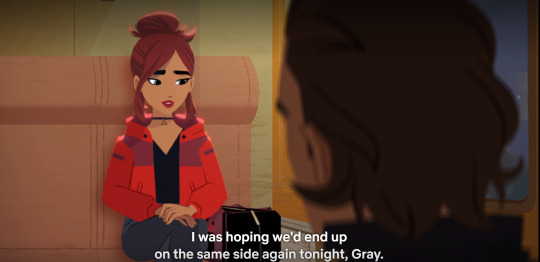
But they can’t agree on which side they should both be:
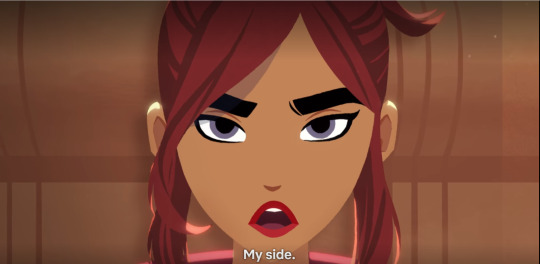
This is because they both refuse a part of the other. This refusal is well expressed through the name symbolism of both characters.
On one hand Gray keeps calling Carmen Black Sheep:
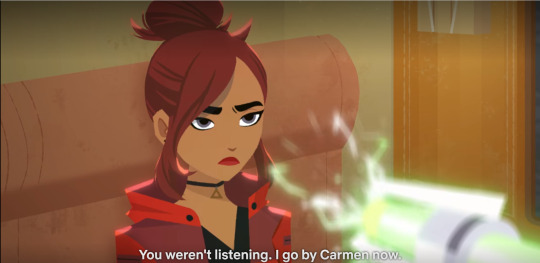
He refuses her new identity because he does not understand it:
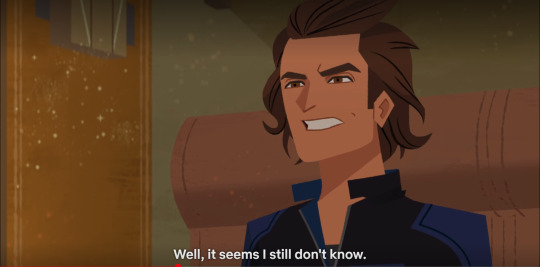

On the other hand Carmen refuses Gray’s VILE persona, but also his civilian one.
This is interesting because her refusal of “Crackle” is something Carmen does willingly:

She does not genuinely understand it, just like Gray does not understand her being Carmen Sandiego.
At the same time, though, Carmen somehow also refuses Gray’s civilian identity and keeps calling him Gray instead of Graham:
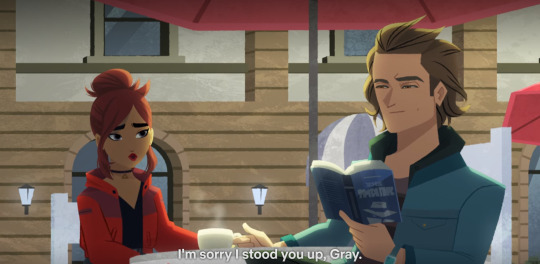
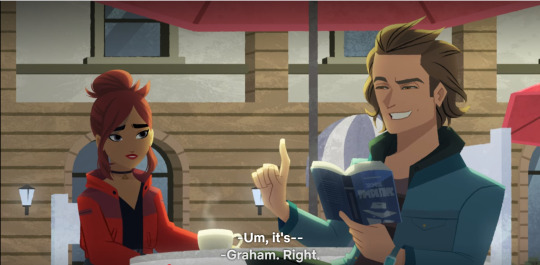
Even if the brainwashing makes their friendship easier, Carmen still feels something is amiss. The person in front of her is not really “Gray”, but somehow a “white” version of him. It is not by chance that she is able to partially rebuild their past relationship by involving him in a dangerous mission:
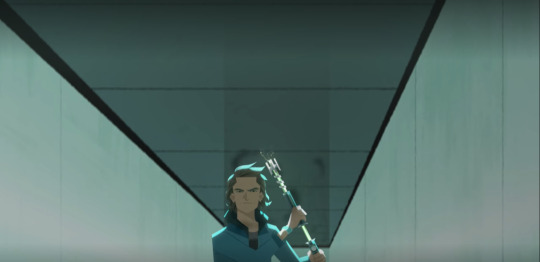
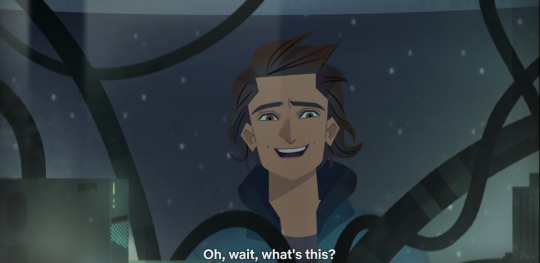
And in this mission Carmen needs Gray’s “wicked skills” that are still a part of him. She becomes Gray’s link to his previous world:
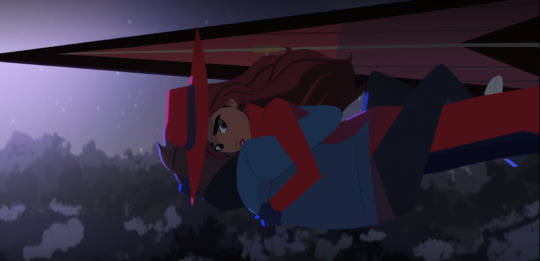
Just like he is the one who symbolically introduces her to what truly means to be a criminal:

And to its harsher aspects:
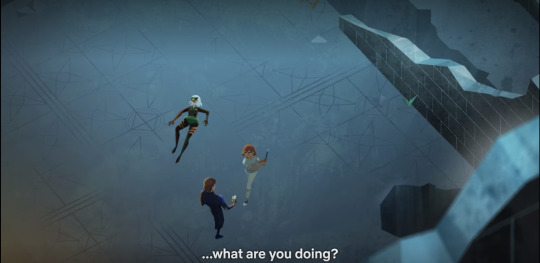
At the same time, it is interesting that when brainwashed Carmen still refuses the codename Crackle:
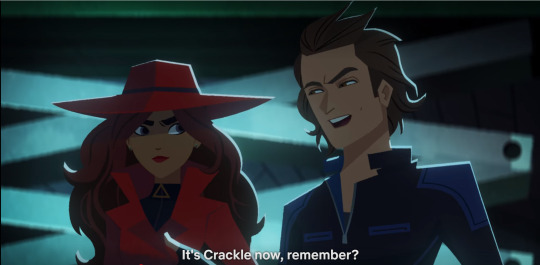
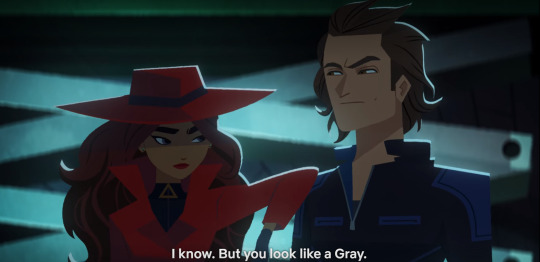
And she only uses it when she thinks he has betrayed her:

In that moment it is as if Gray truly became “black” for her and changed from her partner in crime to an enemy.
In short, both characters can’t truly pintpoint who the other really is.
Who is Carmen really? And is Gray good or bad?
The answers to these questions are difficult because Carmen and Gray themselves are not sure until the end of the series.
THE MISSING MATRIOSKA AND BROKEN LIGHTS
Carmen does not know who she is, while Gray is caught up between his wish to be a criminal and his empathic side.
These internal conflicts are well conveyed through specific motifs linked to the two characters.
Firstly, Carmen’s journey of self-discovery is commented by the burnt matrioskas motif:
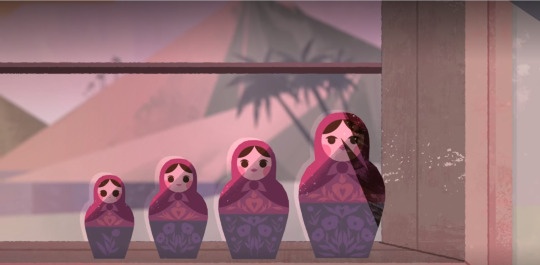
The matrioskas are what links Carmen to her biological family. They’re the only things she has had since she was born and it is later revealed they’re a toy her father used to calm her down.
At the same time, the matrioskas symbolize Carmen herself. Like her “oldest traveling companions”, she too is made of multiple identities who live inside her and change as she grows. She starts as Lambkins, grows into Carmen Sandiego and finally discovers her identity in the finale:

Both in terms of her origins and who she wants to be:

The missing matrioska represents both. On one hand it is the link to Carmen’s past and it is symbolically the smallest one (like a baby). On the other hand seeing it makes Carmen remember who she wants to be.
In short, the matrioska is Carmen’s missing piece both when it comes to who she was and to who she will be.
As far as Gray is concerned, him being caught between “light” and “darkness” is conveyed by his electrician’s motif:
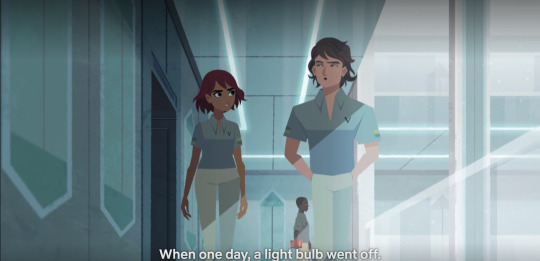
Gray’s criminal career started when a light bulb went off. This is an ironic inversion of a light bulb switching on when one has an idea. Still, it also symbolizes a fall to darkness. Gray’s job was supposed to switch lights on, but he chooses to turn them off, so that he can steal.
This motif comes back in season 2 ep 7 where Carmen’s mission is to stop Doctor Bellum from causing dangerous black-outs. This is tied once again to Gray’s character. As a matter of fact not only the objective is to avoid physical blackouts, but also to stop Graham turning back into Crackle once again. The blackout which must be avoided is the one of Gray’s personality.
At the same time, this motif is not as straightforward as it may seem:

As a matter of fact the whole reason Gray has turned into Graham is a metaphorical “black-out”. This is an interesting idea. Gray has left criminality and can have a new beginning and Carmen sees it as a positive thing. However, this whole new identity is a lie built through brainwashing:


Carmen has good intentions and is ultimately proven right about Gray’s good nature. However, she is still ready to accept a persona constructed through an unethical method.
She meets an idealized version of Gray, she realizes something is missing, but still accepts it. This is why she needs to see this illusion shatter and to confront the real Gray once more.
This happens when Gray gets his memories back:
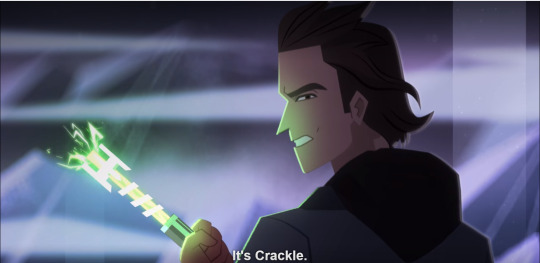
The one on the Himalaya is the second real confrontation between Carmen and Gray after the one on the train.
At this point, we are shown how they have changed and how they have not.
On one hand Carmen is finally forced to accept that Graham was nothing, but an illusion:
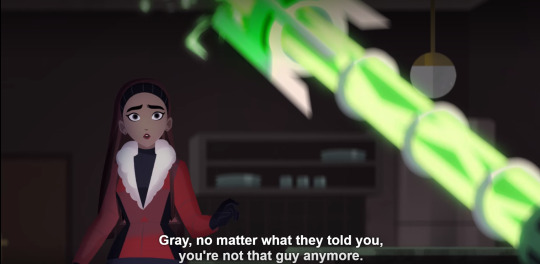

However, she does not completely give up on Gray:
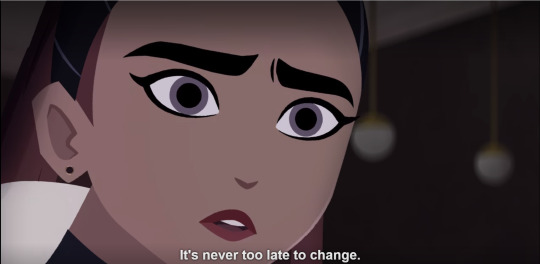
Even if confronted with the truth she still hopes Gray will change. It is just that this change to be true should happen because of her friend’s free will and not through a coercion.
On the other hand Gray has grown enough to accept Carmen:
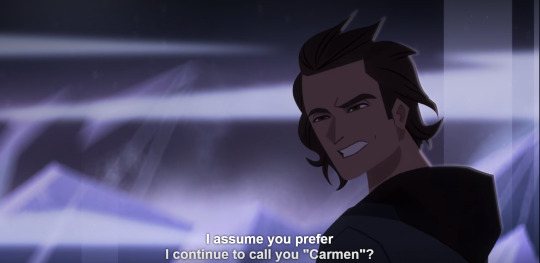
And to realize she will never come back to VILE. However, he still begs her to stop fighting the organization. In short, he has grown a little, but is still asking Carmen to give up on her life mission, just like she wants him to give up on criminality.
The two characters have clearly grown closer, but they are still unable to see eye to eye and this is why they end the episode as enemies, despite this:
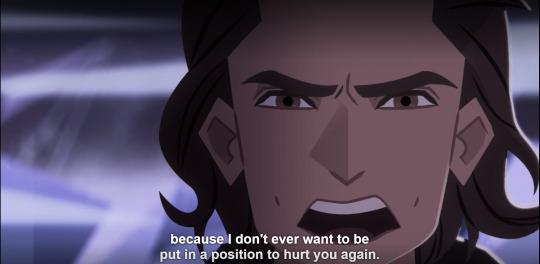
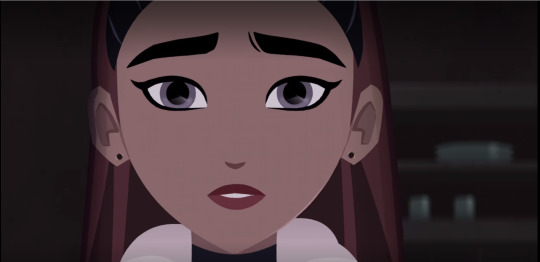
There is clearly affection between them, but this affection is not enough to let them overcome their rift. At least not in that moment.
THE FLYING DUTCH AND THE RED PHANTOM
In season 4 ep 4, while Gray is about to make his choice, we hear a song from The Flying Dutch in the background. This is not a surprise because Graham and Carmen’s relationship has also an Opera motif.
Graham works in a operahouse and famous operas pieces comment his relationship with Carmen while brainwashed. They meet at The Carmen, are reunited through The Swan Lake and finally Graham turns into Crackle again while The Flying Dutch is playing.
This last opera is important not only for Graham’s story, but also for Gray’s overall arc. As a matter of fact the story of this opera is one whose main theme is about how love leads to redemption.
This is precisely what happens to Gray in the end.
In particular, he finds himself in the position Carmen was just a while before: he meets an idealized version of Carmen.
Brainwashed Carmen is who Gray has wanted Carmen to be all along. She is loyal to VILE, close to him and in love with stealing.
However, despite Gray having all he ever wanted he quickly realizes he does not like it at all:
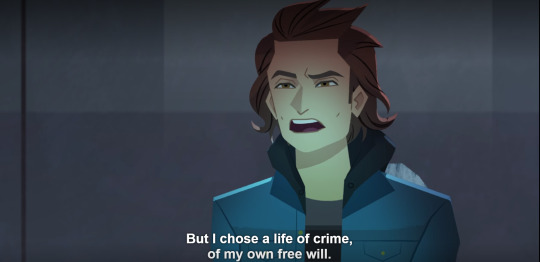

Black Sheep realizes she does not want anything to do with VILE after she sees how the organization has transformed Gray.
Similarly, Gray decides to betray VILE after he sees what they did to Carmen. This is interesting because, while Carmen refuses to work both for VILE and for ACME, Gray ends up working for both.
Anyway, in the end Gray leaves VILE out of love.
Not only that, but he shows to have been influenced by Carmen on a deeper level:
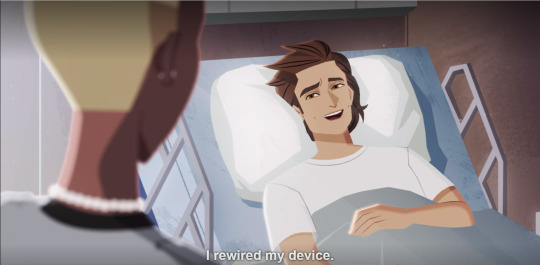

It is because of this that Gray survives his final confrontation with his old classmate.
All in all, Gray manages to save himself and he and Shadowsan are the two people that helped Carmen to save herself the most.
At the same time, Gray and Carmen’s story ends on a bittersweet note. They have both hurted each other, but still clearly love each other:


Despite this, they are avoiding each other. This is not something new, if anything Gray’s final choice:
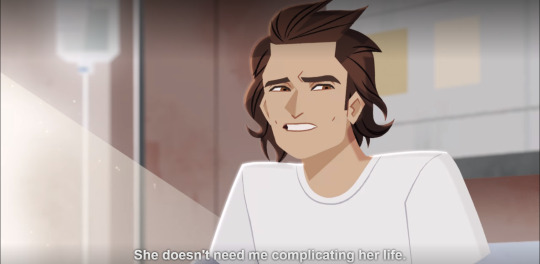
Perfectly mirrors Carmen’s one in the first season:

Both times the two characters decide that the best thing for the other is for them to walk out from their lives. However, I think that both times this is wrong.
Carmen’s decision is later on proven wrong by how the story develops. Gray would have never truly changed if Carmen had not walked in his life again and he would have stayed prisoner of a lie forever.
Gray’s decision happens at the end of the story and seems to be built on this idea:
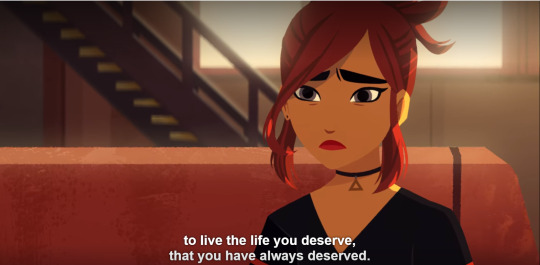
The idea is that Carmen deserves a normal life. She deserves to stop being a symbol aka Carmen Sandiego and to become a person. She can now live a normal life and meet her mother.
However, even if it seems Carmen will do just that and she even disbands her gang aka her adoptive family, in the end we are shown this:

Carmen has not given up on being Carmen Sandiego and on fighting criminality. Whatever happened after she met her mother, she goes back to her previous identity. This is because Carmen Sandiego is not just a mask she has worn all this time, but it is genuinelly a part of who she is. The difference between the beginning and the end is that Carmen previously was Carmen Sandiego because she did not know who she was, while now she is because she knows.
Carmen will always be both a good person and a thief. She is both and ironically she has told us (and Gray) this since the very beginning:

Because of this, Gray’s worrying he will make Carmen’s life complicated if he even just contacts her is probably false.
Anyway, in the end their relationship has an open ending, but both characters have both realized who they are and who they want to be and they have done so with the other’s help.
381 notes
·
View notes
Note
How would you change Fallout 4?
Okay so this is a long one so it’s under the cut
As I’ve mentioned before, I would make the main plot focus on synths as a metaphor for McCarthyism (and to a lesser extent transness). This is assuming a magical world where I have full creative control over a main game in a major franchise. The main character would either be a wastelander (with optional traits to be an escaped synth, mind-wiped or not) OR if we’re going with the Sole Survivor then it would confirm the Sole is a synth theory; if the game’s going to make roleplay decisions for me, at least let them be thematically satisfying and cool.
The four faction companions would all be synths (Sturges, Danse, X6, and Glory) and would all represent a different take on synths in society. Danse would be basically the same, synth who doesn’t know it, self-hating, forced to change through self-acceptance or die in Blind Betrayal. The main change would be significantly changed behavior after BB and a chance to join the Minutemen or Railroad. Glory would be a synth who knows she’s a synth, and is very concerned with synth welfare and autonomy. X6 is a synth who has been mind wiped several times by the Institute due to his increased contact with the outside world. As he travels with the main character, there are decision points where X6 raises concerns about “glitches” (developing a personality as he gains experiences) and the player can decide whether to wipe his mind again or continue to travel with him. Before max affinity, he will ask for your help escaping the institute once again, you can complete his quest or you can turn him over to be mind wiped. Sturges is a synth with a Railroad identity, but who has traumatic memories resurfacing after the attack on Quincy. He is stuck between the true, harmful memories of the Institute or the false, comforting memories of his invented life.
In general the synth’s exploitation by the institute veers away from the slavery metaphor that’s in the game. Robots address labor issues very well and the slavery thing was weird and bad, so we’re moving away from that.
Mind wipes are much more controversial, much more like how they’re portrayed in Far Harbor. Characters like Glory who are mostly opposed to them see them as destruction of identity, not quite murder, but something that should only be done in dire circumstances. Those who are for it, Desdemona and Deacon, see it as a tool for helping synths hide and covering up painful memories (imperfect, as Sturges shows), and that there is an ineffable self that persists between wipes. It’s a source of tension even within the Railroad.
The Institute doesn’t have synth spies, but it does have human spies. The idea that the institute would 1) put synths in charge of major cities while still claiming they aren’t sentient and 2) put their constantly-escaping labor force on the surface with minimal supervision always bothered me. Institute agents foment anti-synth movements on the surface and sabotage synth sympathetic communities.
However, synth paranoia still totally exists. The combination of institute interference and the presence of freed synths, the public is terrified that their friends could be replaced by synths. In reality, the “confirmed” replacements were freed synths who either died (and evidence of them being a synth was found on death) or felt that it was safe to admit to others that they were a synth. No body snatching actually ever existed.
McDonough is a regular wasteland human, a corrupt Boston politician. He made his political career on anti-ghoul fearmongering, but after kicking the ghouls out of Diamond City he needed a new target. He is not associated with the institute, but since he began targeting synths he has received monthly campaign donations. He started the synth activities committee to investigate suspected synth sympathies among the citizens of Diamond City and its surrounding neighborhoods.
That’s the main plot stuff but for companions the main changes are:
Preston is a faction leader, not a companion. He’s very involved and has the same character arc, but the quests he gives are less radiant and more focused, with a plot moving forward.
Hancock is not a companion either, and is less of a good guy than in the game. Goodneighbor’s government serves as a condemnation of the founding father’s idea of freedom and that kind of American libertarianism. (Really, he’s an anarchist but also immortal mayor-for-life?)
Piper is a blacklisted journalist and the most vocal critic of McDonough’s anti-synth policies. She’s somewhere between an Edward R Murrow-esque anti-McCarthyist and an underground journalist. She’s a little more self-admittedly editorial and is openly for using journalism to change hearts and minds. She’s also a better writer than in the actual game.
Curie is a Mister Handy instead of a Miss Nanny because I find the concept of a girl Mister Handy that does the housework (especially when that’s already what Mister Handys do?) a bit silly. She voices more of a desire to be human and have control over her own body, rather than just “I want to do zee science better.” She even admires the player character if she is a woman. You can go the regular in-game route (with strong objections and disapproval from Glory, who doesn’t like to see someone she was close to inhabited by someone else) or you can use the institute to print a synth body for Curie. This route can be done under the guise of an “experiment” if you are part of the Institute (although some scientists may question the scientific value of such a plan) or you can get Liam Binet’s help if you’ve made contact with him as a spy for the Railroad. If you print Curie a body, it will be created based on her self-perception, and will look different from her body if you use the wiped synth route.
Ada and Codsworth can have a synth body printed as well, to Ada’s ambivalence and Codsworth’s objections. This can only be done if you are allied with the institute; Binet won’t help if your companion doesn’t seem to want to be a synth. There is no benefit to doing this.
Nick Valentine was a private detective pre-war, not a cop. After the Eddie Winter quest, which skips the collect-a-thon part, Nick wants to solve a case that is all his own, an unsolved wasteland murder that was the first case he had walk away from.
136 notes
·
View notes
Text
«Poetry is not a luxury»: Maya Angelou, Gwendolyn Brooks, Margaret Walker and poetry as resistance
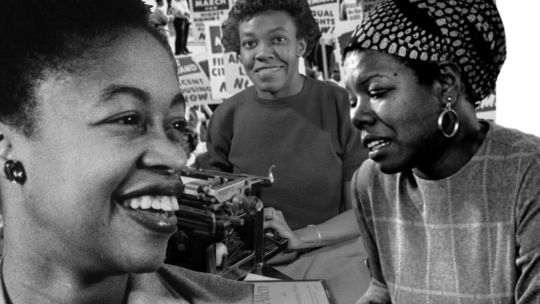
«Poetry is not a luxury»[1], Audre Lorde said. Poetry is not a game, another amusement to dampen the boredom of a humdrum life but it’s a need, a necessity as instrument to the battle against oppression, to self-determination and to identitary resistance because «poetry is power»[2]. And this is as much true and confirmed when poetry becomes activism, when lyricism expresses, and thus bears witness, a discomfort and makes it universal, fathomable through the poetic language; when writing in verse is the only way to express ideas and makes sure they’re recognised in their own dignity, thus it’s necessary in order to save and let respected the existence of that human being who has thought it, in order to this existence can be recognised as such, can arise from oppression and systematic hate, can give voices to those whose lips were ripped off, such as women, for whom «[…] poetry […] is a vital necessity of our existence. It forms the quality of the light within which we [women] predicate our hopes and dreams towards survival and change, first made into language, then into idea, then into more tangible action. Poetry is the way we help give name to the nameless so it can be thought»[3], so, poetry’s place where they can expresses opinions, needs, dreams, hope, in other words themselves, where the cultural system gives preference to other voices, wherein censorship is not official, i.e. perpetrated by an organisation or a law, but it’s cultural because it’s the culture that systematically chooses (a given social class) what creative expressions are more or less are in line with its own values or strengthen them. That’s why for centuries poetry (but also the whole literature) has been place wherein affirm ourselves and the individuality of our own identity, or express pride for a communitarian identity; as it was for women, who found in poetry an instruments they can express their real self through, getting out of the patriarchal control and out of the role they were bonded to by society and came less to the expectations of this one. In this way, women could so analyse her being woman, dreaming to choose who are and what to do, self-determinising and exploring their femininity beyond believes given by a certain historical moment; as it was for black community, wherein black poets could express the a beauty, the varieties, the complexity of their subculture, their traditions, history and so express the pride of being part of this ethnicity, fighting against racism and networking against the oppression perpetrated by a system that privileges white citizens (and more often men). These two concepts converge into the poetic experience of black women poets, for whom poetry became a place wherein speaking of their experience as women and black citizens, wherein they can exist and affirm their existence, «The white father told us: I think, therefore I am. The Black mother within each of us – the poet – whispers in our dreams: I feel, therefore I can be free. Poetry coins the language to express and charter this revolutionary demand, the implementation of that freedom»[4]. Let think of great poets like Maya Angelou, whose poems «often respond to matters like race and sex on a larger social and psychological scale»[5], or like Gwendolyn Brooks, whose poetry, especially the latest, is a political and civil poetry, taking as cultural reference heroes and subjects of the battle for liberation of black people (such as Winnie Mandela, wife to the anti-apartheid activist), but also like Margaret Walker who «through her work, she “[sang] a song for [her] people”, capturing their symbolic quest for liberation. When asked how she viewed her work, she responded, “The body of my work… springs from my interest in a historical point of view that is central to the development of black people as we approach the twenty first century”»[6].
1. Maya Angelou: I know why the caged bird sings
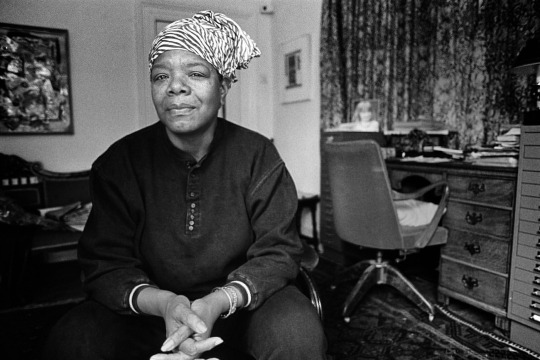
«The poignant beauty of Angelou’s writing enhances rather than masks the candid with which she addresses the racial crisis through which America was passing»[7]. That of Maya Angelou is a lively and melodic voice, her poems can talk even when there’s no human voice to give them sound, they have as mode,s the language of the intense, brave speeches of the great activist of the battle for black people’s rights like Malcolm X and Martin Luther King Jr. Angelou was able to bring together all temporal planes in her writing: both in her poetry and autobiographies, she managed to give voice to the last, to make it a new present, part of the hic te nunc of the existence in action and not anymore as something disappeared with time, but as something that is still here partly, that is still a being. A past that is personal, her life, her youth, her terrible traumas, the beauty of growing before as a girl than as a woman; a pat that is of her community, the troubled story of afroamericana and who that the lyrical I becomes a We, the collectivity becomes a person. The personal experience is thus an exemplum for the common one and becomes even global. The present meets the past, that of when a given poems was born, that of readers, of the poet, it’s the daily battle which becomes memory, it’s the journey to the self-determination in a place where is hostility but also the future, it’s the caged bird that sings and whose song is heard by the free birds, the future is a song overcoming its own time: «The caged bird sings/with a fearful trill/of things unknown/but longed for still/and his tune is heard/on the distant hill/for the caged bird/sings of freedom»[8]. “The caged bird”, dr, Maya Angelou’s favourite metaphor, taken from Paul Laurence Dunbar, famous afroamerican author, is a symbol for the inner freedom that wins ones the oppression of the external, is an eternal song that’s heard until now and if it’s clearly listened, one can hear the thousand of voice from the past and here we can find the beauty in Maya Angelou’s writing: the ability to speak through not one but a thousand of voices, voices of both the present and the past, giving relevance to the last ones, and consequently she was able to tell the future, to be understood by who’ll be after her.
2. Gwendolyn Brooks: writing poetry that will be meaningful

The poetic voice of Gwendolyn Brooks, the first afroamerican woman to win the Pulitzer Prize, is raw, bitter when the language gets filled with political and cultural meaning, when brings a message without forgetting the sweetness, the beauty of a poised, refined style. Worked, studied poems, perfect verse and rhymes, but also intense, hard, which don’t take away to be tough, to tell the truth on oppression, pain, on the battle to re-humanise her own identity in a culture where it was deprived of its otherness, of being an Other Ego, an Other Truth. This happens especially with the her most famous poem collection, In The Mecca, a turning point for Brooks’s poetics. «I want to write poems that will be non compromising. I don’t want to stop a concern with words doing good jobs, which has always been a concern of mine, but I want to write poems that will be meaningful […]»[9] and this was so. Brooks managed to delineate a world, give multiple meanings to the words she used, to the poems, to speak with the voice of her great gallery of characters. In her poems, there’s her Lyric I, but also her characters. Such a polyphony that only few, even among novelists, can make it in such little verbal marks. «The words, lines, and arrangements have been worked and worked and worked again into poised exactness: the unexpected apt metaphor, the mock-colloquial asides amid jewelled phrases, the half-ironic repetition – she knows it all»[10]. A poetry that can speak to its people, community, that hopes, fights for a future where Gwendolyn Brooks «[…] envisioned “the profound and frequent shaking of hands, which in Africa in so important. The shaking of hands in warmth and strength and union”»[11].
3. Margaret Walker: poetry as hope, poetry for the people

Margaret Walker’s poetics is the voice of a whole people, is culture that becomes creative work of a lonely person for the universality and becomes bringer of values. It’s the song of a choir, a choir for the last, of the story of slavery, of that community that still fights for the right to exist; it’s a choir that still sings and never stops to sing the lines of this wonderful poet.
One of the most loved and praised poem of Margaret Walker is “For My People”, which contains all the characteristics that made unique Walker’s poetry and it’s an excursus through the past and more recent history of US Black community, from the tragedy of slavery, to civil battles still fought nowadays in the heart of the New World; «poems in which the body and spirit of a great group of people are revealed with vigour and undeviating integrity»[12]. She uses as reference cultural elements of her community, recalls heroes, events that form that culture as vast as unheard by those who spit poison to not lose the position of privilege, and if this culture isn’t heard, then Margaret Walker addresses also to the deaf. She speaks to them as well, making universal a history that’s particular. Walker speak to everyone through her rhymes, she speaks to the humanity; her poetry talks about tragedies but is full of hope because she knows there will be always someone who still listen, fight, defend, doesn’t forget, «[…] the power of resilience presented in the poem is a hope Walker holds out not only to black people, but to all people […] “After all, it is the business of all writes to write about the human condition, and all humanity must be involved in both the writing and in the reading”»[13]
Viviana Rizzo
References
[1] LORDE, A., “Poetry Is Not a Luxury”, in Audre Lorde, Sister outsider, Trumansburg N.Y., Crossing Press, 1984, p. 371
[2] TODOROV, L’arte nella tempesta. L’avventura di poeti, scrittori e pittori nella Rivoluzione Russa, trans. ita. by Emanuele Lana, Milano, Garzanti S.r.l., 2017, p. 120 (iBooks)
[3] LORDE, A., “Poetry Is Not a Luxury”, in Audre Lorde, Sister outsider, p. 372
[4] Ibidem
[5] EDITORS, “Maya Angelou”, in Poetry Foundation, web, 2021, (https://www.poetryfoundation.org/poets/maya-angelou, retrieved on 24th February 2021)
[6] EDITORS, “Margaret Walker”, in Poetry Foundation, web, 2021 (https://www.poetryfoundation.org/poets/margaret-walker, retrieved on 24th February 2020).
[7] HOLST, W.A., “Review of A song Flung up to Heaven”, in Christian Century (giugno 2002), pp. 35-36, cit. in EDITORS, “Maya Angelou” in Poetry Foundation
[8] ANGELOU, M., The Complete Collected Poems of Maya Angelou, New Work, Random House Inc., 1994, p. 194
[9] EDI TORS, “Gwendolyn Brooks”, Poetry Foundation, web, 2021 (https://www.poetryfoundation.org/poets/gwendolyn-brooks consultato il 24 febbraio 2021)
[10] LITTLEJOHN, D., Black on White: A Critical Survey of Writing by American Negroes, New York, Grossman, 1966, p. 91, cit. in EDITORS, “Gwendolyn Brooks”, in Poetry Foundation
[11] EDITORS, “Gwendolyn Brooks”, in Poetry Foundation
[12] UNTERMEYER, L. “New Books in Review” in Yake Review, vol. XXXII, n. 2 (inverno 1934), p.371, cit. in EDITORS, “Margaret Walker”, in Poetry Foundation
[13] EDITORS, “Margaret Walker”, in Poetry Foundation
#Black women#literature#poetry as resistance#Maya Angelou#ethnicity#resistance#black history month#Margaret Walker#poetry#Black community#Gwendolyn Brooks#activism#people#Black people#battle for civil rights#black lives matter
258 notes
·
View notes
Text
Judgement to the Desiccated ft. Karina
length ✦ 5573
genres ✧ sm type future; asphyxiation; blackmail; virtual_servant!Karina;
✦✧✦✧✦✧
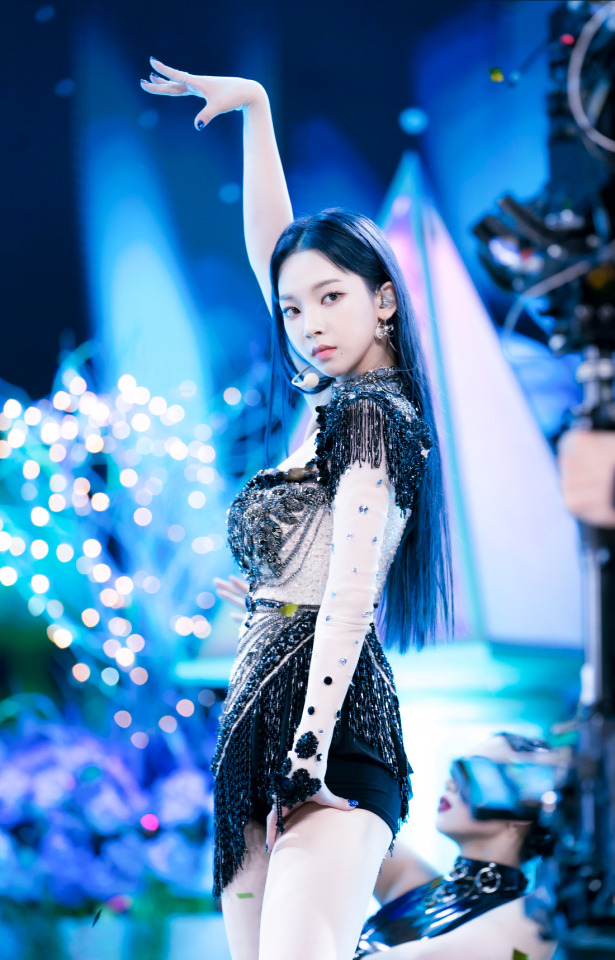
Air did a poor job of not being polluted so Lee Soo Man flooded the world instead. The man himself certainly must be long gone and could not have been in charge of that decision but the legacy of his company far exceeds the legacy of any other human collective in history. Once on this planet, gas was the fluid of choice for respiration and breathing was an unconscious reflex. Now there’s Aether by SM. How very on-brand of them to have the liquid air you breathe follow perfume naming conventions.
Open your eyes and exit the sleeping chamber. Aether has you work for each inhalation, it desaturates the color of the bedroom—maybe there’s a subtle but uncomfortable tinge of yellow—and it makes your nose itch. Your muscles wield much less force than they used to because of the lack of resistance the fluid provides. Moreover, it smells like hairspray as though the ozone layer is taking sardonic revenge.
Screens impersonating windows track your eyes to ensure realistic parallax, playing the scene of divine blue heavens that could not exist. An azure sky is a reward for those planets that have an atmosphere and a sun for light to scatter. Your walls are either chrome or drywall white and your whole bedroom is plainly decorated just like the day you moved in.
“Etymology of bedroom,” you think out loud, though it falls on no ears.
“Bedroom is a compound noun consisting of bed and room. Bed goes back to Old English bedd ‘sleeping place, plot of ground prepared for plants,’ which goes back to the Germanic-”
Plants and sleep are both strong words to use nowadays. The former doesn’t exist in nature and it seems you’re the only one who bothers with the latter. Faint buzzing distracts you from the AI’s response and signals you to the nano drones that swim throughout the liquid to process carbon dioxide from your lungs. This whole ordeal could’ve been much worse if you didn’t have brain interfaces doing the hard part of controlling your diaphragm. The most you need is a purposeful thought. Still, it gets tiring having to think the same thought every three seconds. In. Out.
Was the metaphorical Soo Man teaching a lesson in perseverance? You love K-pop and imagine it’s how trainees used to practice dancing, singing, being charismatic. Being an idol had to be as natural as breathing air. Inhale and exhale. Right now with any antiquated programming language you clung on to, you could write a single for loop that did the same job. For every three seconds: breathe in, breathe out.
“What’s for breakfast today?” Not loud enough. “What’s for breakfast?” you think it louder.
“Welcome, master. Ae-Karina is ready for service.” It’s quite a kindness for SM to blur the bland dystopia you live in by augmenting reality through your neural device. A bosomy woman in a gold-lined but otherwise modest maid outfit appears from the corner of your eye and she bows. Ae-Karina is bewitching and almost becoming of her basis as its graphics have gradually upgraded over the rotations but you wouldn’t misconstrue the avatar as human.
“I said, what’s for breakfast!” It feels impolite to scream in your head, there’s other residents there, but finally the fridge lights up.
“Of course master. May I remind you eating is unnecessary?”
In. Out. Every day, she does remind you, yes. How kind of the company to put all your nutritional requirements in the new air. Aether goes in then Aether goes out. You wish the thoughts of breathing could fade into the background but they’re just like your cravings for food. Always hungry but never starving, whole though not once satisfied. Your eyes pause at her gorgeous face and she tells you there’s bacon. Take it from your fridge. Bacon goes in. Well, the drones take care of the out.
Your assigned living space is the entire 207th floor of a tower. Two hundred and seven floors below the surface. The neighbor a few floors upstairs says that he thinks living deeper is a sign of status. What a luxury. That guy should check the status of his facial muscles, maybe improve his code that lets him tell lies while he’s at it. A couple hundred flights of stairs to swim up is a useless skeuomorphism of skyscrapers in the days of the sun. In fact they were more than useless, you would've preferred a single vertical hallway as it would have let you propel upwards unimpeded. Each floor is the exact same, a glass door that affords no privacy for its residence, a false tree on each side. At the upper levels, malls, convenience stores and other gaudy retail, but it’s the gyms that mock you that you mock in return. They’re always empty.
Finally reaching the top is no true break even if it is a change in scenery. Inhale. Aether tastes a little different up here. Exhale. Can’t say you like it.
Countless satellites form a parody of the star from which the planet flew away, the false image refracted by the upper boundary of Aether. They can’t take away your memories of this star. Looking up at the sky once blinded you with ultraviolet radiation, burning your cornea. It was beautiful. Now everyone’s decided that if they’re playing the part of corporate dystopia, they might as well fit the aesthetic. In a way, it’s self-fulfilling. They wouldn’t have chosen a neon pink sun to compliment the blue and metallic gloom of the cityscape if it weren’t so ingrained in popular media already.
Still, you would’ve expected Google or Walmart to become the megacorp responsible for the state of the world, not a Korean entertainment company. Must’ve been quite the red paperclip scenario. Instead of material design or utilitarian architecture, tacky artistic structures line the streets. The same advertisements for albums that they’ve been selling for the past however long. It's all so obvious, the city could've been designed from scratch to accommodate new forms of travel and goddamn liquid air but instead they went with futuristic Tokyo.
Dubstep permeates your inner ear implants. A notification informs your thoughts that it’s “Hip-hop EDM dance pop with a strong jungle house groove and urban influences.” It’s dubstep. Liquid carries barely any sound so SM affords the option for implants if you're nostalgic for one of the senses. Even though it’s a slower form of communication than direct neural transfer, the noise comforts you. Of course the company would choose dubstep as their background music, but maybe they make money off refunds somehow. It switches to Ice Cream Cake. Much better.
You walk the not so busy roads towards a short brick warehouse in the distance and heavy rain soaks your clothes. No such thing as weather without the sun and water but it’s all simulated anyway.
A warm Seulgi adlib and you know it’s Psycho that starts playing. No, none of your senses are real. The most you could trust is your vision but even that’s being lied to. You could be living in a vat and fed all these thoughts, but then why make it so mediocre? Not paradise, nor torture but a lukewarm in-between. Guess that's what happens when SM Entertainment manages the post-apocalypse. Good on them for trying. The alternative would be a frozen hellscape without solar radiation. Can’t deny their work with geothermal and nuclear energy to keep the Aether warm so that you didn’t have to live underground for the rest of human history. It’s quite great PR to save humanity.
“Hey now, we’ll be okay,” repeats a few more times than you remember.
The Idea Factory Alpha White Delta Green says the neon tubes lighting the front of the brick and mortar building. Your ID card bears a name but it’s not yours, not until they approve your name change. Those usually get processed faster with how often people liked changing their names.
Sit at a desk with a sterile white keyboard and slick new monitor. Type and empty words appear on the screen: “Think for the many, not for the one. We need to think ahead.” A thumbs up. The company appreciates the input. That’s probably enough work for one day. Some SNSD live stages help the time pass, SM certainly appreciated the streaming numbers and it would net you some social points.
It’s hard to say what comes to mind when they ask you to envision a world without the sun and air, especially since it’s what you’ve known for... Two hundred years? There’s no frame of reference, that much you can tell from when you counted seconds to see how often the satellites completed their orbit. SM really took time to have them propel at random speeds, they love withholding sensitive information like that from citizens. To be fair, time is sensitive. Guess the meaning of that phrase changes like all parts of language.
Look around. Dozens of employees at identical workspaces all try to answer the same questions. Naturally, there’s no need for manual labor anymore but there will never be a replacement for human ingenuity. Nice slogan but you know you’re only here for data. Can’t see a need for customer retention though—what’s the alternative, skip Earth? See you on another planet?
“Hey bro, you come up with anything new?” Dave says. Two desks away, you see the enthusiastic, surprisingly spry man play around with a Newton’s cradle. The balls at each end bounce back and forth, not slowing down their rhythm any time soon.
“I think I got something,” you say, “Earth is not the answer. It can’t be, long term.”
“Ooh, I like that. Actually, I really like that.”
“What are you gonna do, copy me?”
“Of course not. You know how much SM hates plagiarism.” Click. Clack.
“Ha. As if there’s a single original thought left in the world.” Click. Clack. The imaginary sounds of metal spheres bouncing play in your mind. They got the volume wrong, no way it’d sound that loud from that distance. “You’d think with all their resources, they’d have figured out space travel by now.”
“I don’t think they want to leave, bro. Wouldn’t be great for profits.”
Your mouth opens to laugh and causes laugh8942.mp3 to play in Dave’s head. “I love it. SM probably hates that sass too,” you say.
“Oh no, they’re gonna arrest me for thoughtcrimes. Nah, they love creativity, just when it suits them. Also, if they actually did bust you for wrongthink like rumors say, I wouldn’t have this on me.” Dave twirls a finger and points at you and you thank his absurd flair for the histrionic that keeps you amused with such drab work.
“NewDrug.mp6. Would you like to play it?” the dry system voice notifies you.
“Woah woah there tiger, hold on.” Dave must’ve noticed your intrigued eyes and holds his hands up. “You might wanna experience that at home. But if you’re interested in more, ask for chicken parm at the vegan place. You know the one.”
Dave leaves his desk. He doesn’t return. You finish your work. Inspire. Expire. You’d rather not.
In contrast to your commute to work, the roads fill with others on your way home. You have to know. Take solace in the comfort of a bench where a huge McDonald’s arch bathes the surroundings and its people with a yellow glow. Really shouldn’t watch it now, especially if Dave says it’s a home type of watch but you have to know. A family of five watches you pass out. They, along with every other passerby, ignore your still body draped over the chrome outdoor seating as you look like yet another junkie. The title is correct after a fashion, the simulation is some sort of new drug. The details of the exploits that happen in the immersive replay wash over you but you don’t need them to know that it’s the sort of lewd that SM would not allow—at least not publicly and not without the right exorbitant payment.
Suit pants and underwear go straight to the laundry. That must’ve been an embarrassing sight but no one bothered to stop you, so it doesn’t matter. Look up where this vegan place was that Dave so presumptuously assumed you knew about and you find that it’s about four Avengers’ stores down from work. He must’ve eaten there before.
“Yo Dave, just wanna make sure, what’s the name of the vegan place called?”
“What are you talking about, man? You telling me there’s some secret underground farms that SM wouldn’t know about?”
You can’t tell when you got to work, a lack of standardized timing would help as well the haze of living in a monotonous dark. “Nah, I mean, for the-”
“I have no idea,” Dave emphasizes each word, “what you’re talking about.”
“I see.”
Work flies by, unusually.
“Hey, can I get a chicken-”
“Uh, this is Maron’s Veggies Only, it clearly says on the sign.”
Clear your throat. “Parm.”
The shifty part-time worker looks around and rubs his fingers gesturing for money. “No digital.”
Over the counter, you pass him a gold coin stamped with a holographic 1 and he hands you a USB stick and a laptop in return. How old-fashioned.
“It’ll sync with whoever you have set as your avatar experience aspect,” the worker says.
“Thanks.”
Ever vigilant as the patrol is, the alleys are the last place you want to go to hide with the obvious criminal element within them all but you head to one anyway. Dump the anachronistic technology in your storage pocket dimensions. Looking at its contents, you’d have to clean that mess up later, but the more you look like an average slob the better. The biggest problem with the inventories is all the people squatting in them. Inspectors wouldn’t care about the archaic ruins you left in yours.
“Welcome, master. Ae-Karina is ready to service.”
“I’d like to go on a date. A special date.” You highlight the key word special and sit on your living room couch. No one’s going to look in your glass door and regardless, you wouldn’t be the pervert for glimpsing into someone’s home.
“Ah yes, master. Ae-Karina is ready to fully service,” she says with a provocative tint in her tone, her sclera disperses to black to match. A pole drops from the ceiling while parts of her maid outfit dissolve which reveals more of the silky skin of her thighs, her lissom arms and most importantly her overflowing breasts. Ae-Karina wraps her legs around the pole and spins around, teasing fingers trace curves on her body to harden you. Her dance is precise but sultry regardless. She pulls up her short skirt to flaunt more of her ass beneath white panties and then pulls down to flourish her cleavage, not trapped by a bra. “Are you enjoying your maid’s show?”
“Very much so, yes,” you say.
Half of a smile forms before a glitch occurs and she teleports next to you, fully nude. It doesn’t pull you out of the illusion however. You just stare and drink in the splendor of her created body.
“You’re not going to touch?” Ae-Karina says.
A feel of her tits and you find it softer than pillows you used to rest on. Soft isn’t much of a character that exists anymore when the whole world is engulfed in liquid. No one has beds, especially with the rarity of sleep. Therefore, her mounds are a consummate dedication to the texture as you squeeze and pinch at her cute nipples.
Her maid outfit rematerializes as she straddles you. It provides more friction to your pants as she begins her lap dance. The weight of her body dragging across your legs and clothed erection induces your carnal impulses further. If only you could fuck the virtual idol. You have to make do with the imprint of her pussy lips on your bulge sliding up and down. Breath in. Breath out.
Ae-Karina pulls down your boxers and spits on your erection. It's not real but her hands so slick on your cock and you let reality slip. Real is for the past, you have desires gratified in the present. There is no real person nibbling at your neck but your nerves activate in sexual desire without discernment for truth. No, she doesn't love you, but when the voracious mass of ones and zeroes says it loves its master, you say it back.
"I love you."
ILOVEYOU infected ten million computers in 2000. An explosion. Calibration engaging. It’s 1:21 PM, Sunday, July 18, 2286 and hypothetically the sun would be out in its full rage. At this latitude and longitude, you’re at what was once the epicenter of all—Seoul, where a fountain caused a chain reaction allowing the hopeful remnant of a world to exist. It lasted a surprisingly long time without the sun and without Aether but the dying planet would succumb inevitably to the ever-increasing contamination so SM of all corporations took charge. A different kind of chain reaction occurred when they acquired a restaurant chain that discovered the recipe for liquid air. The law is on its way and prepared to punish you to its full extent.
You reel while your ears ring. An even sexier version of the woman you already fantasized about appears from your peripheral vision in the crater of your floor. A skimpy cop outfit, striated with reflective material that seems to wane black at different angles, outlines Karina’s curves. She has a tool belt with absurd gadgets, such as a knife baton hybrid, a taser combined with a spray bottle and a Tamagotchi. None of this is necessary. They could just immediately arrest you, impose limitations on your devices. Sure, SM cloned people to deal with underpopulation, but why Karina would be the enforcer is a whole nother issue. Maybe the entertainment company loves their irony?
“Halt. You’re under arrest. Any resistance will be penalized according to the combined Terms of Service of all SM and SM associated products.”
Fucked anyway, you figure you might as well go for it. Escape into your inventory and only seconds later you’re forced out. You manage to get what you need regardless.
“Violation of access rights will be charged to your account.”
It’s so obvious but there’s a reason you kept so much gold in physical storage. As you swim away, the sides of your apartment start to bubble. Bubbles? Already, your limbs feel unsteady. Something’s wrong in the Aether.
“This is standard procedure for escaping suspects that are indoors. Again, this is all agreed to under the Terms of Service.”
“When the fuck did I ever click accept to that shit?”
“When you were born in this world and decided you want to stay in it,” Karina says out loud. You hear her say it. Your physical ears process the vibrations in the air that come from her mouth. Gravity thwarts your desperate escape as your limp body floats on the limit between liquid and air. The atrophy of your muscles becomes apparent within the gaseous atmosphere. She watches you sink down as the room drains of all the false air though her eyebrows crease when she inspects you closer. Your breaths are involuntary. Despite your muscles shorting out, the force of gravity and the pressure of the gas bearing down on you, you’re breathing and you don’t mean to. Her eyes wander farther down. On your pants, a concrete rod stamps the fabric.
“Oh, you like what you see?”
“Shut up, criminal. Anything you say can and will be used against you.”
“Your pussy,” you say and she scoffs.
“Original.” Karina bites her lip as your erection continues to grow behind its prison. You use all effort to put your hands up.
“Please, miss Karina. I’ve been bad.”
“I could punish you even more for sexual assault.”
“Then do it.”
Heat radiates the room in a way you haven’t felt in a while and droplets of sweat form on each of your bodies, especially on the thighs that her revealing outfit parades. Her facial features contort in deliberation and the wait kills you. You bat your eyes at her before Karina takes off her tight shorts and drops herself into your anticipatory face. This makes no sense but none of this life made any sense so you decide to go with the tides.
Centuries of training your respiration has led to this moment, but when you finally have real air to breathe, you spit at the opportunity and choose to suffocate. Then you spit at her pussy and lap it up. Karina’s nectar transfixes your olfactory glands, for once a smell that isn’t the sterile Aether. Your eyes are mesmerized in parallel because of the perfect design of her pussy, a single crease that leads into her hole that your tongue emphatically explores. Karina spreads her thighs wide to reveal a small nub that craves attention. So give it. Suck and swirl and flick your tongue, and the woman provides you the tight clench of her legs as a gift. And the sounds, rediscovered glorious noise. Loud, almost too loud, and clear is how they assault your ears, even surrounded by the flesh of her thighs. Muffled by the weight of her legs, you hear Karina moan in approval but she’s still clearly in charge with how she chokes you with her legs. This is not about your pleasure but hers, and any satisfaction that you derive is not only incidental but probably punishable by SM copyright law.
Karina squirms her hips subtly on your mouth. Her eyes are sharp and she’s just about to stop your hands from moving but she notices them clasp together.
“I’ll do anything to make you cum, please.” you say sloppily as her pussy juices fill your cheeks and drip down your chin.
“God. I can’t.” She takes deep, contemplative breaths. ”That’s more time added on for inappropriate behavior.” Her groaning and brief squeals make her words sound incogent.
You give her a concluding lick and a kiss on her slit. “So what have you been doing right now then?”
Point to a corner of the room and a subtle red light indicates a recording camera. At once, she pulls out a hose from a pocket that could not fit it and the vacuum submerges the room with noise. Her expression shifts quickly to serious.
“We don’t play games here in SMTOWN unless it’s SuperStar so don’t fuck with me.”
“Look who's trying to be a comedian. How about you fuck with me any further and the video gets released.”
“That’s funny, you think you have any sort of power-”
“Yoo Jimin, I suggest you don’t push me more.”
“Where do you know that name from? Right now.” She weighs herself down on your neck.
“You think I don’t have contingencies for if I die too? Karina, we can make this a win-win scenario. We both get to cum, we both get to walk away unscathed.”
“Fuck you.”
Your weak arms wander between her thighs. At any moment, a feeble punch towards your face or another ten seconds of asphyxiation and she could call your bluff. Even if you did have the ability to expose her perversions in any way, there would be no permanent recourse, not as long SM was in charge. So it surprises you when Karina takes off her shorts.
“Goddammit. Your cock just looks too good. And your mouth, how are you so good with it?” Put up five fingers when she motions to remove her top as well, and instead she opts to take off your clothes, seizing your pants and throwing them to join the rubble in the room.
A finger slips in, then two and a third dares. Her flawlessly architected pussy lips clings to your digits and Karina shudders in reply. You explore her wetness and find it’s smooth to the point of having no faults, but her juice inside is gloppy and causes your fingers to stick more than the liquids she spills from her slit.
“Who said you’re allowed to have more?”
You lap up the nectar on your fingers. “Then why’d they make you taste so good?”
Your thumb teases her sweet tight asshole and puts just the slightest amount of pressure on it while you finger her with more intensity. The mass of her butt burdens your torso the closer she gets to orgasm. Her eyelids squeeze close and you see her body ripple in anxious pleasure. Karina shows off her pearly whites, teetering on the cliff of hysteria.
“Yes, yes! I’m so close,” she screams.
"Not yet."
“Fuck." Karina sobs, "God. Damn, fuck I'm sorry. I'm sorry. Just fuck me.”
“My pleasure,” you say. There’s no need for you to grab her since she brings herself down to your groin, which you’re thankful for as your arms are as good as jelly now. Fortunately, your cock throbs as hard as ever while Karina’s slit rests on it.
“Say you’ll delete it all, all the evidence, promise me.”
“You’re gonna fuck me first or what?” Your breath hitches while she makes a strangled noise as her velvety walls swallow your cock whole to leave no room for comfort. Her tightness is stifling and you have to start counting just to breathe again.
“One two-”
“Be quiet.”
But there is no quiet when pleas for your cooperation intersperse her excessive profanities when she seats herself into your cock and ricochets up and down. Sweat emanates from her creamy skin while her legs widen to find a better angle for her supporting knees in her cowgirl position. Grapefruit and other citrus mingle with the scent of the sweat, fruits you haven’t seen except on billboards in music videos. As much as your mind crackles and your blood roars for every atmosphere of pressure Karina’s walls provide on each thrust in and out, you can’t help but reminisce on sweeter, more innocent times.
The white fluorescent lights in your apartment sputter. For all the advancements in technology, some among many things never change. Light refracts differently in air, less bright, but you can see the pure enjoyment on Karina’s face no matter the luminescence. Karina slows her ride to pull her hips down harder instead and she jolts when your cock finds the most tender spots inside her pussy and it interrupts her babbling.
Karina almost hyperventilates when she gets up to spit on your cock. She pulls out some kind of meter from her tool belt and sighs when there’s no beeping and you recognize it having to do with carbon dioxide. She gets back to dribbling saliva and the filament trailing down to your shaft mesmerizes you. This spit is real, not simulated, and it wettens your erection in a mix with her pussy juices to paralyze you further in your already listless state. Her bare thighs jiggle and you can’t exert much force with your hands but her buttcheeks are firm with just a bit of give.
“Thank you for this cock, thank you for being bad,” Karina says as you watch her ass sink deeper while her pussy holds your dick taut. She’s frenetic when bounces up and down to play an unadulterated orchestra of slick noises between your groins.
“You’re welcome,” you accomplish getting out the words between planned breaths. Your hands cup her buttcheeks but you fear they may break with how she strikes her ass into you.
Karina turns around once more to give you the spectacle of her facial expressions as she fucks herself into you. Knead her calves laying on your torso and they take no energy to spread them though she brings them back together, compressing your hard shaft within her pussy. A new game you play with her, a separate rhythm of loosening and tightening. Her feet press on your chest to help her bounce, but the way they bear down on your lungs against the timing of your breathing causes you to fumble. Your cock bends straight forward as she plunges herself into you and it sends prickles to your entire skin, making the new angle difficult but worth it. Karina takes your hand and starts sucking on your fingers.
“You want my promise that bad?” you say.
“Yes, as bad as I want your cum. I swear, I need it.”
She draws her knees up to her torso and hugs her legs to keep thighs as tight together as possible. Karina couldn’t keep her word, she was trying to kill your cock with constriction.
“Fuck, your pussy is so fucking tight. God, Karina, fuck. You’re so good.” Even if good isn’t the word you want to use to describe her.
“Do it, please, please. I’m sorry, I’m so sorry, baby. Karina can be a good girl, a good maid, a good cop, whatever you want. Just don’t get me in trouble, please.”
Karina’s mouth stops saying words though her lips writhe, drunk in increasing lust. Her cheeks flush, before the rest of her skin joins in redness while she grapples your chest and whatever spare limb she can find. You still struggle wresting control of your body but nature seems to take over when you drive yourself into her and match her needy cadence. The air in the room is replaced by a new air but it isn’t Aether. Passion, sweat, heat and all fluids that you both exude join squelching sounds, slaps and moans in harmonic bliss when her body tenses and she screams. As her body tightens, her pussy especially holds your cock for dear life and endeavours to wring out all your semen as her wetness throbs and spills. Karina starts counting to three repeatedly and you laugh though your amusement quickly subsides when you feel her juices become more viscous and she continues her ride, even in the dying pulses of her climax.
“Was I good?” Karina asks.
Just a moment goes by before you mentally send her a screenshot of all the recordings being deleted. Karina hasn’t stopped fucking you yet so at least it wasn’t a ploy.
“Thank you, thank you, I love you.” The flexion of her pliant legs brings them all the way back to rest on top of your legs. Karina lays prone above you and finally give you a kiss. The citrusy flavor may be closer to lime than grapefruit but it’s been so long that you can’t remember which scent is which. Lips crash and her tongue lashes out at yours trying to establish dominance. Keep still to let her investigate your mouth while her pussy does the same to your shaft.
You savor the way Karina’s top emphasizes the bouncing of her tits synchronous with the rebounding of her waist on your cock, but your mouth waters when she frees them. Take the shortest moment to relish in the sight before Karina smothers you with her plump globes. You wriggle your face to try to breathe. Inhale, up and exhale, down, but all you inhale is the scent of her orbs’ sweat. Her hips undulate with a pace at least double yours breathing and the echoes of slapping flesh resonate throughout the air-filled chamber. The loudness is unlike any you’ve experienced in a long time. It’s almost a flashbang every time her ass slams into your lap, especially as you start to see white when orgasm threatens to overload you with preludial pulses.
The last words you hear infected ten million computers in 2000. Fade to black. Cut. You’re slammed out of existence back into existence as a sun rebirths both within you, heating your core to a dangerous high, and from your eyes, dazzling you in an unforgiving white light. In the throes of unconsciousness relapsing to consciousness back to tenebrosity, your streaks of semen suspend in the Aether like a dead tree resting from the wind. What flashes your mind in its orgasmic state are two things only you would remember, plants and weather. Your hyperventilation is unconscious but not unwelcome, as it’s the first time in a while your breaths were reflexive even in the liquid air. However, basking in your newfound power, you start to choke. Right. You breathe in and out again. In and out. In. Out. In. Out. Back in.
“Replaying KarinaArrestsYou.mp6.” A hint of vexatious glee in the system’s otherwise dry voice. You don’t stop for it.
✦✧✦✧✦✧
AFF, AO3
It’s pretty silly but the idea danced around in my head ever since I saw the absolute Black Mirror concept that SM had for aespa and I concur that Karina is insanely hot.
As I’m writing this, this Kurzgesagt video on the idea of a rogue Earth comes out and now I have to rewrite stuff to make it at least a little consistent. I’m obviously already going nuts with all these ridiculous sci-fi concepts but this video almost feels too targeted to me writing this for me to ignore it.
418 notes
·
View notes
Text
roman: princy or princess?
ok i know the title sounds like crack, but hear me out:
Roman’s whole deal is being a prince. Hes got the costume, he plays up the gimmick, he even has a fricking sword. We know this, we’ve seen the ups and downs of this in the series, and we know the black and white, prince vs evil mentality is about to explode in everyone’s face (more so than it already has, that is) because who everyone expects/wants him to be doesnt line up with his real self, and he’s still not at the point of truly accepting himself for who he isnt (a cookie cutter, perfect prince) and is (a mess) (via @beauty-and-passion bc i love their analyses so fricking much), but we’ll come back to that
Roman’s primary inspiration (via c! thomas’ perception) is disney princes, so lets take a look at their usual jobs in the films.
Vanquish evil
Advocate true love
simple enough, right? just like roman, at first it seems that way. Im sure at the beginning of sanders sides we all thought he would be a showy, pretty boy prince who wanted thomas to be ‘good’. Because princes always get rid of the evil in the end, right?
but we know how thats worked out for roman. Mean to virgil, backfired awfully. Condemned janus, everyone’s against roman now. Separate from remus, it came back to bite thomas. And it was fine, roman would have put up with anything so long as it only hurt him, but because thomas got hurt everything is worse. (of course, this is the case with janus too, but i’ll come back to that)
everyone knows by now that there’s going to be a reckoning next episode. We’ve seen thomas costumed as remus, so he’s gonna be in there. Roman had a breakdown last ep, backed into a corner and a confrontation, so if he isnt there when his twin is i am going to riot. Janus is definitely going to be there bc the last ep saw jan fINALLY being accepted (also a part of that confrontation), and i’m just dying to know where virgil has been as well so he might also show up. The whole gang’s gonna see what chaos goes down if patton even sneezes in their general direction
where was i going with this, i had a point
RIGHT
So vanquish evil has failed every which way for roman. Whats left? True love. Now, in most films this refers to a princess, but i think roman’s focus always has been and always will be thomas. He was heartbroken when the whole ‘thomas was lying about roman being his hero’ (or at least roman interpreted janus’ nod that way), his whole theme is because thomas needed a prince to save him from the ‘bad thoughts’ ie remus (which is irrelevant to my point so we dont have time to unpack all that rn- /ref)
But because he failed to vanquish evil the ‘right’ way (even though literally everything patton ever said led him to believe he was doing the right thing-), he’s failed to show thomas the ‘true love’, hence he is no longer thomas’ hero. No longer his prince.
whaBAM, entire basis of his identity no longer exists
So what’s left?
disney is still there, its a core part of roman and no amount of anguish will lessen that it was a core part of c! thomas’ creative development
on that note, roman still has to be his core functions. creativity, passion, ego, hopes, dreams, etc
Thinking on it though, none of those ever fit neatly into the prince persona in the first place. A prince is there to serve his ‘kingdom’ (ie the sides + thomas) and to complete the above values, not to be an artist or performer or any of the things thomas dreams of. And there is no room for passion or ego in the life of a prince because he is always looking out for his people (what should be the others’ job). Which begs the question: why was roman a prince in the first place?
The obvious answer goes back to disney being c!thomas’ first forays into storytelling. the princes were perfect examples of ‘goodness’, which as we know is key to what thomas pre-the newer episodes wanted to be, and existing already in familiar stories with killer songs to match, it was an ideal match for a ‘good’ creativity
But deeper than that, i think roman is a prince because thomas needed a placeholder to be his protector. He wasnt yet aware of janus (the metaphorical protector, saving thomas from what he wasnt yet ready for), lying to himself about the dark other sides altogether, and virgil was too busy playing the ‘bad guy’ at the beginning to show his true colors (looking out for thomas is virgil’s purpose, as we now know), but back then? Roman was the one barricading virgil the most, ‘protecting’ thomas from his influence
Therefore! The reason roman was the prince was to ‘save’ thomas from the others, and unconsciously, the ‘dark creativity’. Without the ‘prince,’ thomas would have accepted the darkness all to easily (from roman’s perspective, which once again goes into the subconscious protecting from remus’ stuff)
But, returning to the point (i keep getting off track lol), now the prince is gone. He’s failed in his pursuits, there is nothing else to protect from (ignoring orange), he isnt thomas’ hero
I think, bear with me, he’s going to become more of a princess now.
✨metaphorically✨
Princes, in the typical disney movie, are black and white. Theyre either good (eric, phillip, etc) or bad (see hans). Fight evil, get the girl love interest, live happily ever after, or… dont.
Living happily ever after by fighting evil has gotten roman absolutely nowhere; in fact, it got him ostracized and rethinking his entire self concept, so thats not an option now.
princesses, on the other hand, have gone through a fricking renaissance. Where they used to be as black and white as princes minus the possibly-evil bit and delicate as flowers, now they can be hard-working, law-breaking, dream-chasing, yet still people-saving girlbosses, which is essentially roman on a can label.
im mixing my metaphors, but what roman really, truly needs right now is that metamorphosis. He’s crumbling under the pressure his prince persona puts on him (ha, alliteration). Thomas’ moral dilemma is making his two creativities split at the seams even more than they already have, because if morality is such a spectrum, then why is his creativity so seemingly (forgive the overuse of this phrase) black and white?
If roman could shed the princeliness and take in more princess qualities (ie a certain disregard for the rules, doing whats right [for thomas, that is, which is being himself {a theme in many princess-centric films} despite expectations] by ignoring pre-set rules and expectations), he’d be so much healthier in the long run
Thats not to say he should be a princess aesthetically. Dude said himself- he is a manly man who is manly, but the free spirit so many disney princesses seem to envelop could better not only roman, but thomas
this way, roman doesnt *have* to be perfect to be ‘good’ (something thomas still values, but in a different way now as we see in SvS redux). He can be his truest self (ego, passion, dreams and all) without contradicting who thomas sees roman as. He can go back to being his hero, if he wishes -- just in a new way
Because all the things that dont fit into being a prince fit perfectly into princesses (and he still gets to keep the innate disney-ness for the aesthetic)
#sanders sides#character analysis#roman sanders#ts roman#i spent an hour on this#what am i doing with my life#my dinners gone cold bc i was too intrigued#i dont regret it tho XD#prose by ani#ani rambles#i think it fits in both categories
42 notes
·
View notes